Jards Macale - see artist discography
 Afonso Machado "Bandolim Do Brasil" (Rob Digital, 2004)
Afonso Machado "Bandolim Do Brasil" (Rob Digital, 2004)
Solo recordings by bandolim master Afonso Machado, of the choro group Galo Preto. It's a pretty sugary instrumental set... About what you'd expect: high technical expertise, with somewhat goopy arrangements. Mandolin and acoustic swing fans may want to check this out...
Celso Machado - see artist discography
 Edison Machado "...E Samba Novo" (CBS, 1963) (LP)
Edison Machado "...E Samba Novo" (CBS, 1963) (LP)
As if often the case with these Brazilian jazz albums, there's not really much of a homegrown samba influence to be heard... Even though the songs covered are include bossa standards and several originals by saxophonist J.T. Mierelles, the feel is straight-up, swinging jazz. Still, as a jazz album, this is pretty creditable... Since bandleader Machado plays drums, there is an Art Blakey-like emphasis on the snares (though less of a "pure" hard jazz style). With him is an all-star cast: Mierelles and Paulo Maura on sax, Tenorio, Jr. on piano, and Moacir Santos writing and arranging the bulk of the album. If you're looking for noteworthy Brazilian jazz albums, this is one of the best.
 Edison Machado "Obras" (Vivid Sound, 2002)
Edison Machado "Obras" (Vivid Sound, 2002)
 Edison Machado "Obras 2: O Pulo Do Gato" (Vivis Sound, 2004)
Edison Machado "Obras 2: O Pulo Do Gato" (Vivis Sound, 2004)
Filo Machado - see artist discography
Marina Machado & Flavio Henrique "Flavio Henrique & Marina Machado" (Tratore, 1997)
Marina Machado & Regina Sposito "Desoriente Um Pais" (1998)
Marina Machado "Baile Das Pulgas" (1999)
Marina Machado "6 Horas Da Tarde" (EMI, 2002)
Marina Machado "Tempo Quente" (EMI, 2008)
(Produced by Milton Nascimento)
Regina Machado "Violao 7 & Bandolim" (2000)
 Regina Machado "Sobre A Paixao" (Dabliu, 2000)
Regina Machado "Sobre A Paixao" (Dabliu, 2000)
Another fascinating, atypical release on this challenging Brazilian indie label. Machado combines a bossa-informed acoustic style with lightly operatic vocals and chamber music orchestration -- the Brazilian equivalent, if you will, of Elvis Costello's Brodsky Quartet outings. For those less inclined towards art songs, her vocals may wear thin after a while, but overall this is a fascinating release, well worth checking out. (Also includes a pair of older German-language Heinrich Heine pieces, and a cover of Caetano Veloso's "Este Amor.")
Regina Machado "Pulsar" (Tratore, 2005)
Regina Machado "Agora O Ceu Vai Ficando Claro" (Tratore, 2010)
With Italo Peron and Norberto Vinhas...
Ed Maciel E Seus Cariocas Serenaders "Na Cadencia Do Samba" (Sinter, 1957) (LP)
 Ed Maciel "Essa E A Jogada" (Copacabana, 1973) (LP)
Ed Maciel "Essa E A Jogada" (Copacabana, 1973) (LP)
Wow! This later album from trombonist Ed Maciel has a genuinely funky soul-samba feel... Well, at least in parts. Some of it's crap, like his cover of America's "Ventura Highway," and the Doobie Brothers' "Listen To The Music." But, whatever. He makes up for it with the snazzy opening track, "Festa," a dynamic funk-pop instrumental that gives '70s fusioneers like Chick Corea and LA Express a run for their money. Also nice is the sambadelic "Canario Do Reino," and maybe less exciting are the various potpourri tracks sung with a perky female chorus. Still, Maciel's work is ripe for the picking: best-of collection, anyone?
Tito Madi - see artist discography
 Madrigal Renascentista "Antologia Da Modinha Brasileira" (Philips, 1976) (LP)
Madrigal Renascentista "Antologia Da Modinha Brasileira" (Philips, 1976) (LP)
An odd little album, with madrigal-style renditions of MPB standards (by Tom Jobim) and other material that's less familiar from composers such as Joubert de Carvalho, Jaime Ovalle, Hekel Tavares, and others. I suppose this is the Brazilian equivalent of the "chant" fad of many years ago... Doesn't do much for me, but it may have novelty value for some...
 Madrigal Renascentista "Madrigal Renascentista" (Atracao, 2010)
Madrigal Renascentista "Madrigal Renascentista" (Atracao, 2010)
I'm not sure if this is the same album as the one above. Could be. Anyone know for sure?
 Mauricio Maestro/Nana Vasconcelos/Joyce "Visions Of Dawn" (Far Out, 1976/2009)
Mauricio Maestro/Nana Vasconcelos/Joyce "Visions Of Dawn" (Far Out, 1976/2009)
 Mauricio Maestro/Nana Vasconcelos "Upside Down" (Far Out, 2011)
Mauricio Maestro/Nana Vasconcelos "Upside Down" (Far Out, 2011)
A new collaboration -- recorded in 2010 -- from two Brazilian experimental musicians whose partnership spans back to the early 1970s. Guitarist Mauricio Maestro and percussionist Nana Vasconcelos rekindle their creativity with this mellow, melodic set which is primarily instrumental music, punctuated by nonsensical vocalizations, simple chanted refrains, and on a few tunes, full lyrics. It's similar in style to the amorphous folk-jazz-MPB of Vasconcelos or Milton Nascimento, but Maestro -- who co-founded the 1980s pop group Boca Livre -- has a more pointedly "pop" approach, with light, lilting melodies and a joyful vibe filing the sound. It's a little Sufjan Stephens-y, and easy on the ears... Singer Kay Lyra sings on several tracks, reprising the role that Joyce played on the Maestro/Vasconcelos session, Visions Of Dawn in 1976. A little gooey, but pretty listenable overall... Definitely worth a whirl!
Sidney Magal - see artist discography
 Os Magnatas Do Samba "Ninguem Ensaiou" (CBS, 1971) (LP)
Os Magnatas Do Samba "Ninguem Ensaiou" (CBS, 1971) (LP)
Sort of a proto-disco/easy listening samba-pop fusion album, with breezy arrangements and a cheerful vocal chorus that stops just short of chirpy. Some of it's okay, but there's a Herb Alpert-ish, muzak-y tone that makes it slightly less groovy than the more rootsy pagode samba that was bubbling up at the time... Worth a spin, I suppose, but more as kitsch than as roots music.
Os Magnatas Do Samba "Volume 2" (CBS, 1971) (LP)
Tim Maia - see artist discography
 Amado Maita "Amado Maita" (Copacabana, 1972) (LP)
Amado Maita "Amado Maita" (Copacabana, 1972) (LP)
The lone album by singer/composer Amado Maita, who was known for his work with pianist Guilherme Vergueiro and songwriter José Wilson Lopes. It's an odd album: Maita has modest vocal talents, but could be roughly placed in the same continuum as the bossa crooners of the '60s, while the musical backing is by various jazz musicians, notably drummer Edison Machado and pianist Vergueiro, and the accompaniment is pretty challenging -- loungey, but with distinct avant leanings, colored at times with early '70s proto-disco touches. The jazz shadings become more and more pronounced and ultimately places this album in the jazz-vocals category... You can see why this might have had limited appeal, though it is a fascinating period piece. Maita married Myriam Taubkin, an arts activist who was part of the Taubkin family; their daughter, Luisa Maita became an MPB singer and solo artist.
 Luisa Maita "Lero Lero" (Cumbancha, 2010)
Luisa Maita "Lero Lero" (Cumbancha, 2010)
(Produced by Paulo Lepetit, Rodrigo Campos & Luisa Maita)
A lovely album of dreamy, femme-y vocals from Sao Paulo native Luisa Taubkin Maita (the niece of Brazilian jazz pianist Benjamin Taubkin, and daughter of MPB artist Amado Maita...) This bossa-esque set invites comparison to other modern, genre-hopping chanteuses such as Bebel Gilberto and CeU, but Maita has less invested in the club-scene electronica that defines their work. This is, at heart, a gentle, stripped down MPB set, reminiscent of Astrud Gilberto's classic early work, with a subtle jazz flavoring... Maita is lulling and sweet on the album's many slow and moderate-tempo songs, but she also proves herself supple and adept at her phrasing on more uptempo material. Also worth noting is that most of the music on here was written or co-written by Maita, further marking her emergence as a noteworthy new performer o the Brazilian scene. If you are looking for something mellow yet substantive, this set of groovy Brazilian ballads may be just the thing for you. Recommended!
 Luisa Maita "Remixed" (Cumbancha, 2010)
Luisa Maita "Remixed" (Cumbancha, 2010)
(Produced by Various Artists)
 Celia Malheiros "Sempre Crescendo" (Sempre Crescendo, 2001)
Celia Malheiros "Sempre Crescendo" (Sempre Crescendo, 2001)
A Brazilian expatriate living in California, Malheiros recorded this album in Rio, with a slew of top Brazilian jazz talent to back her up. Hermeto Pascoal, Wilson Das Neves and others contribute to this lush set of soft jazz tunes that recall the heyday of '70s MPB-era fusion by the likes of Flora Purim and Tania Maria; although Malheiros doesn't get as swoopy or wild as those foremothers, preferring to stay on the mellow side, she's still in the same ballpark. (Artist website: www.celiamalheiros.com)
Celia Malheiros "Cenario Brasileiro" (2006)
With a guest appearance by Joao Bosco...
 Celia Malheiros/Carlos Malta/Thomas Clausen "After The Carnaval" (Stunt Records, 2009)
Celia Malheiros/Carlos Malta/Thomas Clausen "After The Carnaval" (Stunt Records, 2009)
A jazzy set by a threesome going by the name of tRIO: pianist Thomas Clausen, flautist Carlos Malta and singer/guitarist Celia Malheiros... Elegant and sugary, but not saccharine or false. Certainly worth a spin if you like the mellower stuff...
Sabrina Malheiros "Equilibria" (Far Out Records, 2005)
Sabrina Malheiros "Vibrasons" (Far Out Records, 2006)
Sabrina Malheiros & Alex Malheiros "The Wave" (Far Out Records, 2009)
Sabrina Malheiros "New Morning" (Far Out Records, 2009)
Sabrina Malheiros "Dreaming" (Far Out Records, 2011)
Gui Mallon "Guitar" (1996)
Gui Mallon "Brazil, Brazil" (1997)
 Gui Mallon "Live At Montreux" (Adventure Music, 2004)
Gui Mallon "Live At Montreux" (Adventure Music, 2004)
Brazilian-born guitarist Gui Mallon is an expatriate living in Switzerland; here, he's assembled a top-flight European band for a smooth-jazz set glides nimbly over a solid foundation of Brazilian melody. Rhythmically, this is a very strong set, surprisingly so for a band that seems mostly made up of northern Europeans... It's more "Brazilian" at its core than you'd imagine, although when the jazz elements kick in, you definitely know it. There's one thing that sinks it for me, though, and that's the prominence placed on the soprano saxophone, an instrument that I generally regard with pure loathing. Still, I was able to listen to this entire album without skipping tracks, etc., so these guys must have been doing something right! If you like smooth jazz that has a little bite to it, then this set is well worth checking out!
Carlos Malta - see artist discography
Horacio Malvicino "The Brazilian Touch Of Malvicino" (Decca/RCA-Microfon, 1967) (LP)
In addition to being a key collaborator of accordionist-composer Astor Piazolla, the architect of the nuevo tango, Argentinian guitarist Horacio Malvicino was a highly regarded jazz player on the international stage. This included stints with Brazilian masters such as Antonio Carlos Jobim, Joao Gilberto, and on this album he delves into Brazilian currents, especially the then-current bossa nova. This album has version of several Jobim songs, such as "Corcovado," "So Danco Samba," and "One Note Samba," as well as Gilberto's "O Pato," and others.
Mamelo Sound System "Mamelo Sound System" (Ybrazil Records, 2000)
I haven't heard this one, but apparently it was a big deal, with guest appearances by manguebeat stars Nacao Zumbi and foundational rap legend Afrika Bambaataa; also, soul singer Paula Lima was in this edition of the band.
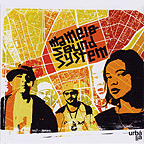 Mamelo Sound System "Urbalia" (Ybrazil Records, 2003)
Mamelo Sound System "Urbalia" (Ybrazil Records, 2003)
Monotonous, paper-thin pop/rap/tronica, with a glimmer of crunchy, Linkin Park-ish "alt-rock" guitars thrown in from time to time. These Sao Paulo rappers sound like petulant teenagers, while the music mix is so weak and one-dimensional, it's difficult to care about what they are saying, or where the group belongs in the Brazilian musical landscape. It's a real snoozer-oo. Then again, I'm just a grumpy old man, so what do I know? Perhaps if you like lightweight pop-rap, this is simply brilliant. Da bomb, and all that.
Mamelo Sound System "Operacao: Parcel/Remixalia" (Tratore, 2005)
Mamelo Sound System "Velha Guarda 22" (Tratore, 2006)
 Mandala "Mandala" (Morisom, 1976) (LP)
Mandala "Mandala" (Morisom, 1976) (LP)
A rarity of spacy Brazilian jazz, from keyboardist Luiz Roberto Oliveira, who also apparently became interested yoga and new age spirituality. Saxophonist Roberto Sion, Nelson Ayers, Zeca Assumpcao and other Brazilian jazz artists are part of the ensemble...
Manduka - see artist discography
Abilio Manoel - see artist discography
Sandra Mara "Poema Do Morro" (Epic Records, 1975) (LP)
 Marcelo "Marcelo" (EMI, 1978) (LP)
Marcelo "Marcelo" (EMI, 1978) (LP)
The first album by the incredibly long-necked Brazilian actor-composer Marcelo Costa Santos, who found a slick disco-fusion-funk groove, and made what some folks consider a funk-fusion classic... Almost all of the songs on here are originals -- although he does cover a Caetano Veloso song -- with a standout track being the widely posted "Algo No Ar," a driving, propulsive fusion tune worthy of LA Express-ability... Marcelo recorded about a dozen albums total... When I have more time, I'll let you know about the others as well.
Marcelo D2 - see artist profile
 Marcia "Eu E A Brisa" (Philips, 1968) (LP)
Marcia "Eu E A Brisa" (Philips, 1968) (LP)
Understated bossa nova ballads... I can't say as I'm a huge fan of her voice, in particular, but these are classy recordings. This album is notable for including the debut recording of Johnny Alf's song, "Eu E A Brisa," which became a bossa/MPB standard. Overall, this disc was a little too sedate for me.
Marcia/Various Artists "DISCOS ODEON - AO VIVO" (Odeon, 1973) (LP)
A live showcase for some of the lesser-known artists on the Odeon label, including singer Ari Vilela, along with Marcia, Simone and jazz vocalist Leny Andrade...
Marcia "Rimas" (EMI-Odeon, 1973) (LP)
Marcia "O Importante E Que A Nossa Emocao Sobreviva" (1975) (LP)
Marcia "Eu So Queria Ser" (Pointer, 1983) (LP)
 Marcia "Volume One: Pra Machucar Seu Coracao" (Caravelas, 1995)
Marcia "Volume One: Pra Machucar Seu Coracao" (Caravelas, 1995)
Marcio & Goro "Atrevida" (1997)
Marcio & Goro "Ponto G" (1998)
Marcio & Goro "Festa Surpresa" (Abril, 1999)
Angela Maria - see artist profile
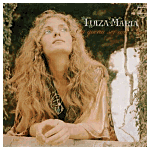 Luiza Maria "Eu Queria Ser Um Anjo" (Philips, 1975) (LP)
Luiza Maria "Eu Queria Ser Um Anjo" (Philips, 1975) (LP)
(Produced by Sergio de Carvalho)
A cool bluesy boogie-rock, psychedelic album by a husky-voiced gal who could belt it out like Tracy Nelson or Mama Cass, and a compact, all-star session crew backing her up that included Antonio Adolfo on piano, Lulu Santos on guitar, Chico Batera, Rick Ferreira (who also wrote some of the material and did some of the arrangements) and Jim Capaldi (of the British folk-prog band Traffic) pitching in as well. Her voice is a little hard to handle, but the musical backing is cool, sort of similar to Rita Lee's stuff around the same time, but better. The music ranges from spacey, cosmic epics to funky blues jams and delightfully opens with a bluegrassy country number, "Na Casca Do Ovo," which is a style very foreign to mainstream Brazilian pop. Apparently, Luiza Maria went on to sing backup for several stars, notably Tim Maia and Ivan Lins, but other than that I don't know how much of a dent she made in the music scene. This disc is definitely worth a spin, although many listeners may find it a bit grating.
Luiza Maria "Tarantula" (Leblon, 1993)
 Marcia Maria "Marcia Maria" (Capitol Records, 1978) (LP)
Marcia Maria "Marcia Maria" (Capitol Records, 1978) (LP)
(Produced by Carlos Lemos)
Blech. I dislike her voice, as well as the bland, '70s jazz-pop arrangements. Kind of a slick, fusion- and disco-tinged MPB ballads session, with a laid-back, moderate-to-slow tempo throughout, so that in addition to sounding too slick, it also feels a bit lifeless. Notable, I suppose, for some of the backing musicians: Lincoln Olivetti and Jorge Robson anchor the band, which also features some veteran jazz players, such as Aurelio, Ze Bodega, Ed Maciel, clarinetist Netinho, and other old pros. Didn't do much for me, though.
 Marcia Maria "Colo Do Rio" (Caravage/L'Arome, 1985)
Marcia Maria "Colo Do Rio" (Caravage/L'Arome, 1985)
Clattersome, overly energetic samba-jazz vocals from a Brazilian expatriate living in Paris, backed by an enthusiastic European trio. This is the sort of music that, when I play it at home, my wife is likely to hurl heavy objects at me across the room in order to make it stop. Maria's aggressive approach derives from the Tania Maria-Elis Regina school of shouted vocal power... I found this to be really irritating, though jazz fans might be more forgiving. Apparently, Maria recorded one album earlier in Brazil, not long before she headed for France.
Marcia Maria "Brasil Nativo" (Fremeaux & Associes, 2008)
 Neusa Maria "A Melhor Cantora De 1956" (Sinter, 1957) (LP)
Neusa Maria "A Melhor Cantora De 1956" (Sinter, 1957) (LP)
A long-forgotten vocalist from the pre-bossa era; Ms. Maria was a pretty-sounding, but relatively bland singer, backed here by light, inconsequential orchestrations. Patti Page comes to mind, or Doris Day, perhaps. Nothing "bad," but also not terribly dynamic or inspiring. Includes a few Italian-themed numbers ("Que Sera Sera," "Arrivederci Roma," etc.)
Silvia Maria "Coragem" (Arte Maior, 1981) (LP)
Tania Maria - see artist profile
Ze Maria - see artist profile
Cesar Camargo Mariano - see artist profile
Torcuato Mariano "Paradise Station" (Windham Hill Records, 1994)
Torcuato Mariano "Last Look" (Windham Hill Records, 1995)
 Torcuato Mariano "Diary" (215 Records, 2004)
Torcuato Mariano "Diary" (215 Records, 2004)
A very, very soft jazz fusion set. Not my cup of tea, but for the smooth jazz set, I imagine this'd be kinda nice.
Torcuato Mariano "Lift Me Up" (215 Records, 2006)
Torcuato Mariano "So Far From Home" (Nu Groove Records, 2009)
Marina - see Lima, Marina
Marines & Sua Gente - see artist profile
Evandro Marinho "O Som Do Barzinho, v.6" (Universal, 2001)
Evandro Marinho "O Som Do Barzinho, v.7" (Universal, 2001)
Evandro Marinho "O Som Do Barzinho, v.8" (Universal, 2001)
Evandro Marinho "O Som Do Barzinho, v.9" (Universal, 2001)
 Evandro Marinho "O Som Do Barzinho, v.10" (Universal/Matrix, 2001)
Evandro Marinho "O Som Do Barzinho, v.10" (Universal/Matrix, 2001)
Volume Ten of this intriguing and generally pleasant live acoustic series, with singer-guitarist Evandro Marinho working through an intimate set of MPB ballads, songs written by the likes of Djavan, Gilberto Gil, Gonzaguinha, Beto Guedes, Ivan Lins and Caetano Veloso (as well as some less well-known composers). The audience sings along, sharing an affection for the audience: it might not be the original artists singing the songs, but the magic is still shared.
 Francisco Mario "Retratos" (Fantasy/Caju Records, 1994)
Francisco Mario "Retratos" (Fantasy/Caju Records, 1994)
(Produced by Francisco Mario)
This reissue pairs up two albums by Minas Gerais guitarist Francisco Mario, Conversas De Cordas, Courous, Palhetas E Metais, from 1984, and 1986's Retrato, which found him working with many of Brazil's best modern jazz/choro performers, such as Zeca Assumpcao, Paulinho Baga and Raphael Rabello (who played on the Conversas album...) Nice stuff, with a wide variety of regional influences; his use of amplification makes him sound a bit like a Brazilian Chet Atkins... Apparently Mario died in 1988, from HIV disease... Alas! Another voice sadly silenced.
Marisa - see artist profile
Marku - aka Marku Ribas
Marlene - see artist profile
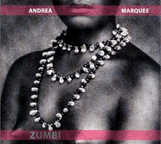 Andrea Marquee "Zumbi" (YBrazil/Stern's, 2000)
Andrea Marquee "Zumbi" (YBrazil/Stern's, 2000)
Trip-hop and soul-tinged pop, with nods to the past such as covers of songs by Caetano Veloso, Jorge Ben and Zeca Pagodinho, as well as a slew of original tunes. Marquee isn't as forceful as fellow soulster, Daude, nor as spazzy as supersinger Daniela Mercury, though that's the general area she's aiming for. This didn't set off any bells for me, but it may be of interest for others looking for contemporary, post-MPB pop that's a little off the beaten path.
Andrea Marquee "Melhores Momentos" (BMG, 2002)
Dercio Marques - see artist profile
Doroty Marques "Erva Cidreira" (Discos Marcos Pereira, 1980) (LP)
Doroty Marques "Semente" (Discos Marcos Pereira) (LP)
Ivanilton Marques "Umbanda" (Nortson Records, 1977) (LP)
 Jayme Marques "Brasil Pop" (RCA-Spain, 1975) (LP)
Jayme Marques "Brasil Pop" (RCA-Spain, 1975) (LP)
A Brazilian guitarist who initially took his cues from the Baden Powell/Luiz Bonfa school, Marques was a Mato Grosso native who toured Europe in the early '60s, and is credited with introducing bossa-jazz to European audiences. He later recorded several albums in Spain during the 1970s, becoming a significant exponent of bossa-soul fusion. This early album starts off with fairly standard material -- a jazzed-up version of "Berimbau," followed by several guitar-centered tunes. Breezy keyboards come in midway, and his jazz-fusion tendencies become even clearer with the inclusion of a couple of Marcos Valle tunes. This is pretty lightweight, muzak-y stuff, a little stiff sounding, but not unpleasant (other than his atrocious soul vocals!) This will probably float your boat if you're into the whole lounge/acid jazz sound.
Jayme Marques "Jayme Marques" (RCA-Spain, 1976) (LP)
 Jayme Marques "So Much Feeling" (RCA-Spain, 1977) (LP)
Jayme Marques "So Much Feeling" (RCA-Spain, 1977) (LP)
This has a more deliberate (and more accomplished) jazz-fusion feel... Sleek LA Transfer-style keyboards, flute and bossa rhythms predominate, and while this is decidedly cheesy, easy listening, it's also nice in parts. There are a couple of original tunes on here, along with several well-chosen covers, including a Caetano Veloso's "Irene", and a meandering twelve-minute long(!) version of Milton Nascimento's "Vera Cruz." I'd be a little embarrassed playing this on the radio or listening to it casually at home, but I suppose it's worth checking out.
Jayme Marques "En Directo" (RCA-Spain, 1979) (LP)
Jayme Marques "The London Connection" (Cedar Tree Records, 1995)
 Moacyr Marques "Jazz & Bossa Nova" (Tiger Records, 1961) (LP)
Moacyr Marques "Jazz & Bossa Nova" (Tiger Records, 1961) (LP)
(Produced by Norival Reis)
Saxophonist Moacyr Marques was a longtime member of the TV-studio orchestra of Rede Globo, and also worked in Brazilian jazz ensembles led by Radames Gnattali, Zaccarias and Copinha, as well as with North American bandleaders such as Ray Conniff, Henry Mancini and Nelson Riddle. He recorded a handful of albums under his own name, including this unassuming set of pure easy-listening dance music, leading a small combo that also featured a pianist named Zequinha. I suppose this is vaguely in Stan Getz or Dave Brubeck territory, and okay for folks who like soft/cool jazz of that era... The album is divided in half: Side One covers standards like "Lullaby Of Birdland," "My Funny Valentine" and "Taking A Chance On Love," while Side Two has a bunch of perky, light-jazz renditions of Brazilian sambas and newer bossa numbers. It's a very conservative album, though at the very end, on the last few tracks they branch out a little and try some more ambitious stuff, and take a few longer, more soulful solos. The best song was an original -- "Real Conclusao," written by the band's bassist Artur Barbosa -- this along with the last track, Ribamar's "Ideas Erradas" was where the band's heart was really at. Not dazzling, but performed well and very much of its time.
Paulo Marquez "Orgia Em Samba" (Columbia Records, 1958) (LP)
Paulo Marquez "Doutor Em Samba" (Columbia Records, 1959) (LP)
 Paulo Marquez & Carmen Costa "Musica De Paulo Vanzolini" (Discos Marcus Pereira, 1974)
Paulo Marquez & Carmen Costa "Musica De Paulo Vanzolini" (Discos Marcus Pereira, 1974)
A tribute album to Sao Paulo samba songwriter Paulo Vanzolini, with some duets as well as solo performances by both samba diva Carmen Costa and the less well-known Marquez. His vocals are much stronger, and in the second half of the album he gets into some really sweet acoustic sambas, replete with flute and cavaquinho. Most of the record, though, is of lush MPB arrangements, which are mostly fine though on occasion a rather goofy, cheap-sounding electric keyboard chimes in, sounding at odds with the rest of the classy orchestrations. Nice stuff overall, though: Vanzolini was a very robust and hearty composer, and these are strong renditions of his work, particularly the solo stuff by Marquez.
 Mar Revolto "Mar Revolto" (Musiquim, 1979) (LP)
Mar Revolto "Mar Revolto" (Musiquim, 1979) (LP)
(Produced by Chelito & Silvio Palmeira)
An eclectic, acoustic-y rock album which ranges from semi-new wave and funky fusion to bland choral folk-pop reminiscent of It's A Beautiful Day (or in a more Brazilian comparison, perhaps to Boca Livre?). There's also a steady undercurrent of frevo bandolim-guitar duetting that brings Moraes Moreira and Novos Baianos to mind, though by and large I didn't find this album all that compelling. Well, maybe I take that back: the second half of the album is much more interesting than the first half... It almost feels like they were working it out as they went along, but whatever the creative process might have been, they loosen up and get pretty funky towards the end, particularly on the driving tempo of "Chaxaxado," which is a pretty groovy fusion tune, and should appeal to fans of Mores Moreira. I started out skeptical, but was kind of getting into it by the end. Go figure. Anyway, if you're looking for obscuro, marginal Brazilian rock, this is a good record to track down.
Mike Marshall - see artist discography
 Martinha "Serie Bis: Jovem Guarda" (EMI, 2007)
Martinha "Serie Bis: Jovem Guarda" (EMI, 2007)
Martinha "Como Antigamente" (Warner, 1974) (LP)
 Abilio Martins "Voltei" (Tropicana, 1970) (LP)
Abilio Martins "Voltei" (Tropicana, 1970) (LP)
A popular Carnaval float puxador (someone who leads the crowds in singing the new samba songs), Abilio Martins had a deep, gruff voice, and a plainspoken style that was nonetheless expressive and inviting. The musical backing is what's most unusual on this modest samba set: along with a small, keening female chorus, there's a Walter Wanderley-style organ lacing through the songs, dit-dit-doot-dooting alongside Martins' robust vocals. Not an immortal record, but a nice one, with an unusual feel that makes it a bit of a curio.
 Herivelto Martins "Carnaval De Rua De Herivelto Martins" (Mocambo, 1957)
Herivelto Martins "Carnaval De Rua De Herivelto Martins" (Mocambo, 1957)
 Herivelto Martins/Various Artists "Jubileu Herivelto" (RCA Victor, 1957) (LP)
Herivelto Martins/Various Artists "Jubileu Herivelto" (RCA Victor, 1957) (LP)
This is a tribute album released in 1957, honoring the career of Brazilian pop songwriter Herivelto Martins. Martins doesn't actually perform on the record, but the artists who do -- Nelson Goncalves, Dircinha & Linda Batista, Ivon Curi, Carlos Galhardo, Trio De Ouro, etc. -- represent the creme-de-la-creme of the pre-bossa "radio singers" era. If you like old-fashioned nostalgic music, this is a wonderful collection. Nice instrumental choro/jazz turns from Jacob Do Bandolim and Zaccarias, as well!
 Herivelto Martins/Various Artists "SINFONIA DE PARDAIS: UMA HOMAGEM A HERVIELTO MARTINS" (Som Livre, 1999)
Herivelto Martins/Various Artists "SINFONIA DE PARDAIS: UMA HOMAGEM A HERVIELTO MARTINS" (Som Livre, 1999)
A lovely, luminous version of "Pensando Em Ti," crooned to perfection by Caetano Veloso, kicks off this tribute to samba-cancao composer Herivelto Martins. Numerous other MPB elders are in on the project, including Leny Andrade, Maria Bethania, Baby Do Brasil, Beth Carvalho, Moraes Moreira, Ney Matogrosso, et. al. None of the other songs reach the height of Veloso's contribution, though: this is a very glossy, modern, often cluttered affair that leaves behind the antique beauty of Martins' songs, or the charm of his work as a member of Trio De Ouro. Nice liner notes, though -- great way to learn more about his life, even if the music is a little iffy.
 Nelly Martins & Tito Madi "Encontro No Sabado -- Um LP Para Namorados" (Continental, 1959) (LP)
Nelly Martins & Tito Madi "Encontro No Sabado -- Um LP Para Namorados" (Continental, 1959) (LP)
An appealing album of duets made with Nelly Martins, a sweet, Patti Page-ish, plain-jane vocalist from the radio-singer era, and singer Tito Madi, one of the major stars of the pre-bossa era. The two sound really nice together, and the arrangements, though fairly light, have a nice little bounce to them. Madi also sings solo on several songs, which is less fun, but still quite pleasant. Good stuff.
Nelly Martins & Radames Gnattali "Piano Duo" (1967) (LP)
Mart'nalia - see artist profile
Ana Martins "Futuro Amantes" (Rip Curl Records, 2000)
 Ana Martins "Linda" (Rip Curl, 2001)
Ana Martins "Linda" (Rip Curl, 2001)
A pleasant, if underwhelming, second album by singer Ana Martins, daughter of Nelson Angelo and braz-jazz guitarist Joyce. The modest bossa arrangements and her relaxed vocals are reminiscent of '60s-era chanteuses Nara Leao and Astrud Gilberto. Overall, I'd have to say Martins lacks spark -- this disc, sprinkled with guest performers and contributions by both her parents, travels familiar ground, and while it's nice enough, it's a bit on the slack side. Worth checking out, though.
Ana Martins "Samba Sincopado" (Video Arts, 2004)
 Aurea Martins "O Amor Em Paz" (RCA Camden, 1972) (LP)
Aurea Martins "O Amor Em Paz" (RCA Camden, 1972) (LP)
(Produced by Rildo Hora; arrangements by Luiz Eca)
The first album by this Rio-area singer, though her only full-length release for nearly two decades until she returned to the studio in the early 1990s. A challenging and at times uneven record, with a moody undertone that's compelling, though plenty of irritating qualities as well. Martins was one of those brusque, declarative Brazilian singers, in the tradition of Elizete Cardoso, Maysa or Maria Bethania, whose forceful, arty presentation may be difficult for listeners in search of more mellow, readily accessible material. She also doesn't always sing in tune, which can be problematic: I suspect not much time was spent on the recording and remixing of this record, as it has a sort of fly-by-the-seat-of-your-pants feel to it. Most irritating, though, is the softly chaotic piano playing, which has an intrusive, note-heavy improvisational quality, and is frequently distracting. The rest of the musicians sound unrehearsed as well, and while this has the trappings of classic early-'70s experimental MPB, it's more a window into the genre's less-structured side. Luiz Eca is credited as the album's arranger, but this has little of the tightly-sculpted semi-classical feel of his own work of this era, and more of a jazz improv vibe. Minas Gerais poet Paulo Mendes Campos intones on several tracks, doing sort of a Vinicius Moraes imitation, which comes off as yet another distraction on a far-flung, oddly structured album. This is interesting, to be sure, though mostly in a time-capsule way... Not a record I personally could see coming back to very often. But fans of the early-'70s MPB divas will want to check this one out.
 Edinho Marundele & Onias Comenda "Eu, Bahia" (Philips/Fontana, 1972) (LP)
Edinho Marundele & Onias Comenda "Eu, Bahia" (Philips/Fontana, 1972) (LP)
An interesting album of berimbau and Orixa-related percussion by two players I've never heard of before. Each artist takes one side of the LP -- Marundele (whose real name was apparently Edson Emerete de Sant'Anna) is the drummer, and his side is dynamic and intense, running through rhythms from Angola and their Brazilian permutations. Similarly, berimbau master Onias Camardelli plays capoeira music from Angola and Bahia, as well as improvisations of his own creation. Some of it is spooky and haunting, some of it seems kind of static and same-y. I don't think the average fan of Brazilian pop would get much out of this, but for cultural scholars and capoeira students, this album would be a goldmine.
Patricia Marx - see artist profile
Carminha Mascarenhas "A Noite E Carminha" (Copacabana, 1961) (LP)
Germano Mathias - see artist discography
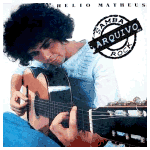 Helio Matheus "Helio Matheus" (RCA-Victor, 1975) (LP)
Helio Matheus "Helio Matheus" (RCA-Victor, 1975) (LP)
Easygoing '70s pop with funky, fusion-y roots -- sort of like what Michael Franks might sound like, if he grew up in Rio. Helio Matheus is the vocalist, but the ensemble backing him includes all the key members of the jazz band Azymuth, including keyboardist Jose Roberto Bertrami. Matheus can be considered part of the groovy-smooth "samba rock" sound of the '70s, and this disc has a pleasantly eclectic vibe -- I'm not a huge Azymuth fan, but compared to their other albums, it's a gem. Light, sweet pop that crosses over with the bossa and Rio funk scenes... For folks who are more into fusion-pop than I am, this would certainly be an album to track down. The second half of the album settles -- surprisingly -- into a folkie sort of vibe, even reminding me at times of Glen Campbell which, strangely enough, I mean as a compliment. The biggest surprise on this album was his cover of "Mi Secreto," a gorgeous romantic ballad that I know from Dominican singer Leonardo Paniagua, translated here as "Meu Segredo." What a trip!
Ney Matogrosso - see artist discography
Nilson Matta & Hendrik Meurkens "Encontros" (Malandro, 2000)
Nilson Matta/Ze Luis/Paulo Braga "Green Heart" (New Orbita, 2007)
Nilson Matta & Brazilian Trio "Forests" (Zoho, 2008)
Nilson Matta "Copacabana" (Zoho, 2010)
A Brazilian-born jazz bassist with roots in the New York music scene, Matta plays several original compositions here, as well as some standards such as "Asa Branca" and "Aquarela Do Brasil."
 Pedrinho Mattar "Pedrinho Mattar Trio #3" (Farroupilha, 1965) (LP)
Pedrinho Mattar "Pedrinho Mattar Trio #3" (Farroupilha, 1965) (LP)
(Produced by Os Farroupilhas)
An excellent, serious jazz album, certainly one of the best of the era, with fluid, swinging leads by pianist Pedrinho Mattar and an equally deft, adventurous drummer backing him up, as well as a solid, smooth bass player. This supple, loose-limbed, improv-heavy performance stands in marked contrast to the stiff, hyper rigidity of most of the "bossa trios" of the era. If you're looking for decent early Brazilian jazz, you'll definitely want to check this out, particularly if you like contemporaries such as Manfredo Fest or Antonio Adolfo -- frankly, I thought this album was more genuinely fun to listen to than most of their stuff as well.
 Pedrinho Mattar "Um Show De Mattar" (Copacabana, 1971) (LP)
Pedrinho Mattar "Um Show De Mattar" (Copacabana, 1971) (LP)
(Produced by Moacyr Silva)
A sometimes perky, sometimes slushy set of jazzy and orchestral soft-pop instrumentals. The small-combo stuff is okay, but the more ornate material is pretty painful -- '70s easy listening in the extreme. Pianist Pedrinho Mattar leads the ensemble, with harmonica player Mauricio Einhorn popping up on several tunes. The material is a mix of Brazilian stuff and lounge-y standards by folks such as Francis Lai, Michel Legrand and Henry Mancini... I'm sure there are lounge music devotees who will get a lot out of this one, but it ain't for me.
Pedrinho Mattar "Brasileirinho" (RGE, 1981) (LP)
(Produced by Reinaldo B. Brito)
A set of older compositions from artists such as Waldyr Azevedo, Ary Barroso, Dolores Duran and Sinho, covered by Pedrinho Mattar on piano, backed by drummer Augusto Arid and bassist Gabriel Jorge Bahlis.
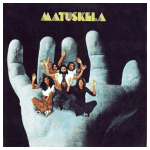 Matuskela "Matuskela" (Chantecler, 1973) (LP)
Matuskela "Matuskela" (Chantecler, 1973) (LP)
One of those weird, wonderful gems from the hippie era, an eclectic folk-prog set packed with acoustic and electric guitars, bongo drums, odd, primitive synthesizer riffs and urgent, yearning, earnest vocals. Although a few regional instruments creep in around the margins, this record lives mostly in a non-Brazilian sphere, a straight-up acid-rock set with echoes of Van Morrison, Santana, The Beatles and Iron Butterfly intertwined in a clunky but charming prog-adelic vibe. There's a lot of stylistic variety, bound together by a spacey, noodly experimentalism -- if you enjoy Alceu Valenca or Ze Ramalho's earliest albums, you might want to check these guys out as well.
 Matuto "Matuto" (Self-released, 2011)
Matuto "Matuto" (Self-released, 2011)
(Produced by Scott Kettner & Rob Curto)
One of the boldest, most exuberant world music crossover albums in recent years... Clay Ross is a jazz guitarist originally from South Carolina, who in his youth rejected the bluegrass and mountain music that he saw as redneck-y and reactionary but came back to it after years of musical exploration in other genres. Here he seamlessly melds modern jazz (including some '70s-style fusion) with regional Brazilian music, mainly choro, forro and baiao, with a touch of twang swirled into the margins. This is an updated version of an album Ross first released in 2009, with several new tracks that place heavier emphasis on the Brazilian vibe, giving a lot of the spotlight to accordionist Rob Curto, who plays some absolutely blistering riffs that will thrill fans of Braz-jazz old-timers such as Sivuca, Hermeto Pascoal and forro legend Luiz Gonzaga. On the country side of things, there's also a nice version of Norman Blake's "Church Street Blues," underscoring the relationship that Ross discovered between Brazilian and Appalachian melodies... A catchy, dynamic and very adventurous album... though also a bit on the challenging side.
Ruy Maurity - see artist discography
 Jose Mauro "Obnoxious" (Quartin, 1970) (LP)
Jose Mauro "Obnoxious" (Quartin, 1970) (LP)
One of the rare records championed by the European acid-jazz scene which actually lives up to the hype. This lovely album ranges from lovely acoustic balladry to lush (but subtle) orchestral pop. A couple of tracks are mildly irritating, but overall this is a winner. The spacey, melodic numbers prefigure some of Gilberto Gil's calmer moments. Musicians include Paulo Moura and Wilson Das Neves, with arrangements by Maestro Gaya. Recommended!
Jorge Mautner - see artist discography
 Yo-Yo Ma "Obrigado Brazil" (Sony Classics, 2003)
Yo-Yo Ma "Obrigado Brazil" (Sony Classics, 2003)
Cellist Yo-Yo Ma, possibly the most celebrated classical musician alive, has understandably fallen for the allure of Brazilian bossa nova, having previously explored Appalachian mountain music and the Argentine tango. Yet, like the countless American and European jazz players that precede him, it's difficult to tell in Ma's luso-classical crossover where the subtlety of samba ends and the glass-clinking simplicity of dinner jazz begins. In the baroque world, emotionally resonant, romantic passages are Ma's forte, but the precision and exactitude of Ma's classical background work against him when approaching the odd, interstitial nuances of Brazilian popular music. Backed by Brazilian virtuosi such as percussionists Paulo Braga and Cyro Baptista, Ma excels when playing the fast-paced, Dixieland-ish instrumentals written by choro pioneer Pixinguinha, though on slower, harmonically indefinite material such as the Antonio Carlos Jobim songbook, Ma sounds stiff and stilted, perhaps a little too perfect. Classical fans will doubtless find this album to be an enriching musical journey, while Brazilians may raise a wary eyebrow of amusement. Lovely performances, but they don't completely hit the mark.
 Yo-Yo Ma/Various Artists "Obrigado Brazil: Live In Concert" (Sony Classics, 2004) (CD & DVD)
Yo-Yo Ma/Various Artists "Obrigado Brazil: Live In Concert" (Sony Classics, 2004) (CD & DVD)
 Yo-Yo Ma & Viva Brazil "Live EP" (Sony Classics, 2012)
Yo-Yo Ma & Viva Brazil "Live EP" (Sony Classics, 2012)
 Rose Max "Atlantico" (Cinq Etoiles, 2003)
Rose Max "Atlantico" (Cinq Etoiles, 2003)
An adequate singer amid slick, somewhat generic slick-soul MPB arrangements. Didn't do much for me, but might be fun for folks who like singers such as Patricia Marx or Luciano Mello.
Maysa - see artist discography
 Ana Mazzotti "Ana Mazzotti" (Top Tape, 1974) (LP)
Ana Mazzotti "Ana Mazzotti" (Top Tape, 1974) (LP)
A mellow MPB pop/jazz fusion album from the mid-1970s that features pleasant, if underwhelming, vocals by Ana Mazzotti and musical backing from members of the well-known Brazilian jazz band, Azymuth. This has been hailed by devotees as a lost classic of Brazilian fusion, and I suppose it is, although I wouldn't get too worked up about it. Mazzotti has a refreshingly cool approach to the music, much like Tania Maria but far less frantic, and the arrangements are similarly cool and relaxed. This features "Roda Mundo," a Mazzotti original that has been covered several times since, notably by the singer Salome De Bahia. This is a nice record, worth checking out, but not earth-shattering by any means.
Ana Mazzotti "Ao Vivo -- Festival Do Verao Do Guaruja: 1982" (FIF, 1982) (LP)
 Ze Luiz Mazziotti "Cancoes De Chico Buarque" (Dabliu, 2002)
Ze Luiz Mazziotti "Cancoes De Chico Buarque" (Dabliu, 2002)
A good, standard-issue MPB homage to master songwriter Chico Buarque... Mazziotti's voice is rich, velvety and confident... The arrangements are fairly restrained, although on the whole this disc may drift into milkier modes than some listeners might like. If you enjoy the elegant, smooth-jazz side of the MPB scene, though, this album is definitely worth checking out.
 Jose Luiz Mazziotti "Jose Luiz Mazziotti" (2004)
Jose Luiz Mazziotti "Jose Luiz Mazziotti" (2004)
Sylvio Mazzucca "Isto E Samba" (Continental Records, 19--?) (LP)
Sylvio Mazzucca "Os Grandes Sucessos" (Tropicana Records, 19--?) (LP)
Sylvio Mazzucca "Baile Do Samba" (Columbia Records, 19--?) (LP)
Sylvio Mazzucca "Baile Do Sucessos" (Columbia Records, 19--?) (LP)
 MC Buchecha "MC Buchecha" (Universal-Mercury, 2003)
MC Buchecha "MC Buchecha" (Universal-Mercury, 2003)
Super-perky, lightweight pop, with a token veneer of hip-hoppish production. Not much to write home about, really. Apparently this is his only solo album, though he's also contributed to a few compilations and other hip-hop projects, as well as the duo of Claudinho & Buchecha.
Marilia Medalha - see artist discography
 Arnoldo Medeiros "O Homen, O Poeta" (RCA, 1975) (LP)
Arnoldo Medeiros "O Homen, O Poeta" (RCA, 1975) (LP)
(Produced by Helcio Milito; arrangements by Luiz Eca)
An appealing album by a successful young MPB composer of the 1970s, backed here by Luiz Eca and the Tamba Trio, as well as a bright chorus made up of members of Trio Esperanca and The Golden Boys. The sound is mostly a soft version of the mellow, summery "samba rock" style, with a disco-y/fusion-y tinge to the production. However, this is one of those pleasant instances where the material and the performances transcend the limitations of cheesy pop production -- indeed, the album is inviting enough that the kitschy '70s sounds are pleasantly nostalgic. I'm not sure if Medeiros made many other records, but this one's really nice, especially with Trio Esperanca singing throughout. Worth checking out!
Elton Medeiros - see artist discography
 Geraldo Medeiros & Orquestra Brasileira De Ritmos "Dancando O Frevo" (Musidisc, 1956) (LP)
Geraldo Medeiros & Orquestra Brasileira De Ritmos "Dancando O Frevo" (Musidisc, 1956) (LP)
Trumpeter and saxophonist Geraldo Medeiros was an integral member of Severino Araujo's Orquestra Tabajara... On this "solo" set, he digs into the frevo style the Tabajara crew excelled at... This set has a rougher, slightly wilder edge, without quite the same sleek panache as the Tabajara albums, and a smaller ensemble as well. (Not sure who the other musicians were, but I assume they were also drawn from Araujo's big band... Sounds like about an eight-piece band, perhaps?) Admittedly, I find the manic pace and static arrangements of the frevo style to be a bit monotonous -- a little goes a long way -- but you're a devoted gafieria fan, you'll want to check this out.
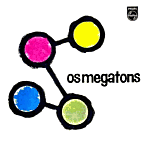 Os Megatons "Os Megatons " (Philips, 1964) (LP)
Os Megatons "Os Megatons " (Philips, 1964) (LP)
Twangy, jangly surfin' rock instrumentals, also with a Shadows-esque tone. To be honest, the lead guitarist(s?) weren't really all that good, but even if they lacked finesse, the band still sounded cute, and they were competent rockers. Like many Brazilian rock bands of the era, I wish they had sung in Portuguese... But I felt the same way about the Shadows as well...
 Helena Meirelles "Raiz Pantaneira" (Eldorado, 1998)
Helena Meirelles "Raiz Pantaneira" (Eldorado, 1998)
An unusual, but un-compelling record from the Brazilian back-country. Meirelles is a little old lady who plays a shiny, metallic guitar that looks like a dobro. Her musical style is atypical: it sounds a lot like Mexican corridos, but is also rather static and monotonous. I'm sure it's super-authentic, but I couldn't get into it...
 Helena Meirelles "Flor Da Guavira" (Eldorado, 1999)
Helena Meirelles "Flor Da Guavira" (Eldorado, 1999)
Helena Meirelles "Grande Dama Da Viola" (Eldorado, 1999)
J.T. Meirelles - see artist discography
Joao Mello "Apresentando Joao Mello Em Ritmos Do Brasil" (Sinter, 1959) (LP)
 Joao Mello "A Bossa Do Balanco" (Philips, 1963) (LP)
Joao Mello "A Bossa Do Balanco" (Philips, 1963) (LP)
(Produced by Luiz Eca)
A delicious set of classy, restrained bossa nova songs from Joao Mello, a prolific composer who also went on to become one of the major session producers of the classic bossa nova and MPB years. Here he is backed by pianist Luiz Eca and the Tamba Trio, in one of their most crisp and understated performances. There's a sweet lilt and danceable bounce to this album, also a pleasant air of imperfection and imprecision -- this could have easily been an overproduced, over-orchestrated pop set, instead, it's a lovely record of small-scale, small-ensemble bossa, a model of economy. Nice to hear such a famous studio producer performing as a frontman for once: sounds great. Features several songs written by Mello, as well as by Tito Madi, Chico Feitosa, Rildo Hora and others.
Joao Mello "Coracao So Faz Bater" (Som Livre, 2000)
Jorge Mello "Besta Fera" (Crazy, 1976) (LP)
Luciana Mello - see artist discography
Luiz Melodia - see artist discography
 Fernando Mendes "Fernando Mendes" (EMI, 1974) (LP)
Fernando Mendes "Fernando Mendes" (EMI, 1974) (LP)
(Produced by Maestro Gaya & Milton Miranda, arrangements by Clelio Ribeiro)
Soporific, ephemeral soft-pop with occasional glimmers of life... Mendes seems to have been ready to take up the Roberto Carlos's long-discarded mantle as a Brazilian teen heartthrob, but boy, is this snoozy. There's one song, "Nao Vou Me Entregar," that has some mildly wild electric guitars on it, but for the most part the arrangements are rather static and slow. You're not missing anything here, trust me.
 Fernando Mendes "Fernando Mendes" (EMI, 1975) (LP)
Fernando Mendes "Fernando Mendes" (EMI, 1975) (LP)
(Produced by Miguel Plopschi, arrangements by Clelio Ribeiro)
There's a lot more stylistic variety from his previous album -- maybe a touch of Santana-esque guitars to spice things up -- but it's still pretty dull material. Leif Garrett and Shawn Cassidy seem like pimpin' mack daddies compared to this wuss!
 Fernando Mendes "Fernando Mendes" (EMI, 1978) (LP)
Fernando Mendes "Fernando Mendes" (EMI, 1978) (LP)
Fernando Mendes "Selecao De Ouro" (EMI, 1998)
A best-of set...
 Helio Mendes "Weekend No Rio" (Musiplay, 1963) (LP)
Helio Mendes "Weekend No Rio" (Musiplay, 1963) (LP)
Unremarkable, third-tier bossa-era nightclub instrumentals... I suspect Helio was banking on folks confusing him with the then-rising Sergio Mendes, a theory which is borne out by his cover (on his other album) of Jorge Ben's "Mais Que Nada," which had been a huge hit for Sergio. Regardless, this is hardly memorable material: the piano work is okay, everything else -- saxophone, accordion, percussion -- is leaden and bland. A cheesy tourist album with, as far as I can tell, no real historical significance.
Helio Mendes & Seu Trio Vagalume "Na Bossa" (Musiplay, 1963) (LP)
Renato Mendes "Electronicus" (RGE, 1974) (LP)
Some sort of electronic music project, with keyboardist Mendes playing on the Moog synthesizer. I haven't heard this one myself, just caught wind of it through the grapevine...
Roberto Mendes "Flama" (Nosso Som, 1988)
Roberto Mendes "Matriz" (Casa Da Musica, 1992)
Roberto Mendes "Roberto Mendes & Baianos Luz" (Velas, 1994)
Roberto Mendes "Roberto Mendes" (Velas, 1994)
Roberto Mendes "Voz Guia" (Velas, 1996)
Roberto Mendes "Minha Historia" (Velas, 1999)
 Roberto Mendes "Traducao" (Atracao, 2002)
Roberto Mendes "Traducao" (Atracao, 2002)
(Produced by Ana Maria T. Mendez)
A super-groovy, funky-freeform, acoustic-samba-MPB groovefest... Bahian singer-songwriter Mendes readily brings to mind Gilberto Gil's exuberant improvisational work of the early 1970s -- the driving, hypnotic fervor is there, as is the light vocal tone. This affinity is borne out in a duet with Gil's old buddy, Caetano Veloso, who adds his elegant touch to "Namorar, Vem Namorar," one of the numerous Mendes originals on this delightful album. Margareth Menezes and Jussara Silveira also chime in, although it's Mendes's fervent, high-energy performance that really makes this album click. If you're a fan of Jorge Ben or Gilberto Gil's classic samba-funk grooves, you'll want to check this disc out as well! (Thanks to the folks at Cana Brava Records, in Salvador, for sending a copy our way...! )
Roberto Mendes "No Embalo Da Seresta" (2002)
Roberto Mendes "Tempos Quase Modernos" (Atracao, 2006)
Roberto Mendes "Cidade E Rio" (Biscoito Fino, 2008)
Sergio Mendes - see artist discography
Martha Mendonca - see artist discography
Roberto Menescal - see artist discography
Jose Menezes "Dedos Privilegiados" (Sinter, 1954) (LP) (10")
Guitarist Jose Menezes was a session player on countless recordings during the 1950s, notably playing with maestro Radames Gnattali. He also led his own combo on a number of records before forming the parodic bossa-era band, Os Velhinhos Transviados. This early album -- originally issued as a ten-inch LP -- includes a number of Menezes's original compositions, including "Um, Dois, Tres" and "Encabulado," as well as some co-written with Luis Bittencourt (who I believe was also known as Joao do Bandolim...)
Jose Menezes "A Voz Do Violao" (Sinter, 1957) (LP) (10")
A nice set of guitar solos, covering a wide variety of styles, such as choro, maxixe, and samba-cancao...
Jose Menezes "Ritmos Em Alta Fidelidade" (Sinter, 1957) (LP)
A jazzy 6-song set from this prolific guitarist... This is a nice EP with Menezes playing electric guitar in a variety of styles, playing samba and regional Brazilian music with a North American jazz-guitar sensibility. His medley of baiao classics, "Nao Interessa Nao/Repinica Raimundo/Xaxado" is particularly noteworthy, giving this sometimes-inaccessible style a sweet, light tone. Nice stuff!
Orq. De Frevo Jose Menezes "Os Maiores Sucessos Do Frevo" (PolyGram, 1983) (LP)
I'm not exactly sure I could describe to you what the style of music known as frevo is all about -- according to the modest liner notes on this album, it was first noted as an offshoot of the capoeira bouts, as early as the 1850s... So it's a rhythm or style of music that predates the maxixe and samba by several decades... But I still don't know enough about it to fairly describe its characteristics or significance. In this incarnation, as played by Jose Menezes's band, it's a fairly glitzty, hyperactive marching band music: if your local college brass band was really, really, really creative, they might come up with something like this.
Margareth Menezes - see artist discography
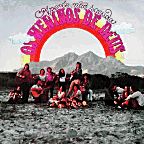 Os Meninos Do Deus "Aperte...Nao Sacuda!" (1974) (LP)
Os Meninos Do Deus "Aperte...Nao Sacuda!" (1974) (LP)
Rock and psychedelic-tinged gospel music from the tropicalia era of Brazilian pop. A modest gospel chorus melds well with Bowie-esque guitar, folk-rock and '70s-style pop; there's a clear debt to Hair and other hippiesque gospel-pop of the time. Overall, this is quite nice, a good mix of perky, earnest innocence and musical accomplishment. Like Communidade S8 (another Brazilian religious group that put out records around the same time) Meninos Do Deus were a musical band affiliated with a larger religious organization, in this case, the Children of God, a creepy, hippie-ish evangelical group from America that had cultish, apocalyptic overtones and was notorious for various sexual practices, including "flirty fishing" (having young women sexually seduce new converts, and find financial "donors" for the cause) as well as allegations of child abuse. If the evangelical angle (and the other stuff) doesn't bother you too much, there are some nice poppy songs on here, although the history behind the music is pretty disturbing. I don't know how much these particular Brazilian musicians were involved in the politics or lifestyle choices of the international organization, although you can read more about them in this post on the Brazilian Nuggets website
Os Meninos Do Deus "Amor Nunca Falha -- Capitulo 2" (Polydor, 1975) (LP)
 Os Meninos Do Rio "Os Meninos Do Rio" (Sony/Carioca Discos, 2000)
Os Meninos Do Rio "Os Meninos Do Rio" (Sony/Carioca Discos, 2000)
(Produced by Paulinho Albuquerque)
An absolutely gorgeous set of old-school acoustic pagode samba, honoring the work of composers such as Ivone Lara, Jair Do Cavaquinho, Elton Medeiros and Nelson Sargento. A bunch of these old-timers are pictured and named on the front cover, and make guest appearances throughout, although the album is anchored by a group of younger musicians who, I assume, go by the name of Os Meninos Do Rio. At any rate, this is a super-lovely record. Fans of Beth Carvalho or the Velha Guarda Da Portela owe it to themselves to track this one down.
Daniela Mercury - see artist discography
Alex Mesquita "Curva Do Tempo" (Rara Records, 2009)
Caio Mesquita "Jovem Brazilidade" (EMI Brazil, 2006)
Caio Mesquita "Ao Vivo" (EMI Brazil, 2006)
A live performance by saxophonist Caio Mesquita, with guest performer Ivan Lins...
Caio Mesquita "Natal" (Luar, 2006)
Caio Mesquita "Jovem Brazilidade, v.2" (EMI Brazil, 2007)
Caio Mesquita "Um Feliz Natal" (2011)
A dreadful easy listening holiday album by saxophonist Caio Mesquita, who was (one of many Brazilian answers to Kenny G. The title track, "Um Feliz Natal," is a cheesy cover of Jose Feliciano's Christmas classic, "Feliz Navidad." Just awful.
Caio Mesquita "Sertanejo" (Universal, 2009)
Custodio Mesquita "Prazer Em Conhece-lo" (Atracao, 1998)
Ronald Mesquita "Bresil '72" (Barclay, 1972) (LP)
The drummer for the late-1960s bossa-jazz band Rio 3, Ronald Mesquita briefly led this Sergio Mendes-ish bossa-pop outfit... The record came out in France; I'm not sure if the group was based there as well.
Suely Mesquita "Sexo Puro" (Tratore, 2007)
Suely Mesquita "Microswing" (Tratore, 2008)
Messias - see artist discography
 Mestre Ambrosio "Mestre Ambrosio" (Tratore, 1997)
Mestre Ambrosio "Mestre Ambrosio" (Tratore, 1997)
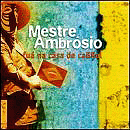 Mestre Ambrosio "Fua Na Casa De Cabral" (Sony/Chaos, 1999)
Mestre Ambrosio "Fua Na Casa De Cabral" (Sony/Chaos, 1999)
Challenging modern music from this youthful mangue beat band out of Recife. A truly weird, psychedelic, distorted take on the street samba sound, mixing spacy electric guitars with clattering percussion and other non-rock instruments, such as pife flutes, an accordion and a violin, and a wild mix of rock, forro, maracatu and other styles. It's kind of like hearing the Quinteto Violado on acid. (I bet they're amazing live.)
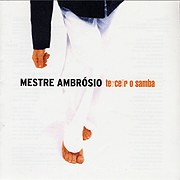 Mestre Ambrosio "O Terceiro Samba" (Sony, 2001)
Mestre Ambrosio "O Terceiro Samba" (Sony, 2001)
(Produced by Beto Villares)
Their third album... another odd, compelling offering from this eclectic regional band... This time around their sound is much more stripped down, in some ways even static, yet the combination of a modern sensibility with antiquated regional styles such as coco and maracatu makes this album sound unique and fresh... The instruments are all acoustic, with a scratchy violin at the center of many songs, and a bit of accordion and forro-style percussion... You can tell instantly that this is a modern band, but their approach is so unlike their rock and samba-oriented contemporaries that it's really quite delightful... Highly recommended!
Mestre Bimba "Curso De Capoeira Regional" (JS Discos, 1969) (LP)
 Mestre Caicara "Academia De Capoeira De Angola Sao Jorge Dos Irmaos Unidos Do Mestre Caicara" (EMI-Copacabana, 1973) (LP)
Mestre Caicara "Academia De Capoeira De Angola Sao Jorge Dos Irmaos Unidos Do Mestre Caicara" (EMI-Copacabana, 1973) (LP)
Stark-sounding capoeira of the "Angola" school, which is slower and less flashy than "regional" capoeira. This band was led by Antonio Carlos Moraes, aka Mestre Caicara, a Recife native who delved into the African roots of Brazilian capoeira, and was one of the first artists to record the Angola style. The rhythm is a slow, heavy beat, spanked out on a tambourine, with the berimbau leading the melody and pushing the movement. The vocals are also slow and deliberate, but also passionate and intense. Recommended, particularly for students of the art...
 Mestre Marcal "...Interpreta Bide E Marcal" (EMI-Odeon, 1978) (LP)
Mestre Marcal "...Interpreta Bide E Marcal" (EMI-Odeon, 1978) (LP)
(Produced by Renato Correa)
Nilton Delfino Marcal, better known as Mestre Marcal, was one of the most highly regarded percussionists of the 1970s, working with some of the decade's top samba stars, as well as recording several albums of his own, highlighting his mastery of batucada drumming. This record is an homage to his father, Armando Vieira Marcal, who sang and played percussion on Radio Nacional in the 1930s and '40s, and Marcal's musical partner Alcebiades Maia Barcelos, aka Bide, a cavaquinho prodigy who also performed on Radio Nacional and composed several early popular samba-cancao hits, including "A Malandragrem," which was first recorded by Chico Alves in 1927. Bide and Marcal backed numerous stars of the 1930s, and were particularly known for their work with legendary choro/samba-cancao flautist Benedito Lacerda.
 Mestre Marcal "A Incrivel Bateria Do Mestre Marcal" (Polydor, 1987) (LP)
Mestre Marcal "A Incrivel Bateria Do Mestre Marcal" (Polydor, 1987) (LP)
(Produced by Durival Ferreira)
A groovy collection of samba enredo Carnaval percussion, culled from various parade albums from the '70s and '80s. Drummer Nilton Defino Marcal, who died in 1994, apparently worked with several different samba schools, including Portela and Mangueira, with invariably great results. This disc should make batucada fans quite happy. The CD version includes liner notes that explain the role of all the various instruments in the bateria. Nice stuff.
 Mestre Marcal "Samba Enredo De Todos Os Tempos" (Velas, 1993)
Mestre Marcal "Samba Enredo De Todos Os Tempos" (Velas, 1993)
(Produced by J.C. Botezelli-Pelao & Argemiro Ferreira)
Percussionist Mestre Marcal takes on the role of a Carnaval puxador, singing lead in a sweeping and celebratory survey of popular Carnaval themes, originally performed between 1949-1988 by several samba schools that he has worked with over the decades. The performance style here is closer to 'Seventies samba-raiz, with the unstoppable rhythm section supporting a large vocal chorus, punctuated by cavaquinho and 7-string guitar, in contrast to Marcal's older, more stripped-down batucada recordings that mainly emphasized the drumming. Among the musicians, drummer Wilson das Neves is perhaps the most notable... Admittedly, it does all start to sound a lot alike, but it's great stuff nonetheless.
Mestre Marcal "Serie Aplauso" (BMG-Brasil, 1997)
Meta Meta "MetaL MetaL" (Mais Um Discos, 2014)
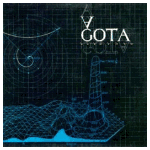 Metro "A Gota Suspensa" (Underground, 1983) (LP)
Metro "A Gota Suspensa" (Underground, 1983) (LP)
The independently-released debut album by this '80s new wave group originally came out under the band name A Gota Suspensa, but they changed to Metro after signing with a major label, and the album got retitled retroactively... The original lineup included lead singer Virginie, who quit the band a few years later when they started to change their sound.
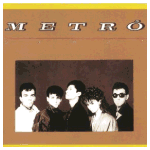 Metro "Olhar" (CBS, 1985)
Metro "Olhar" (CBS, 1985)
This was Metro's big hit album, and it's a pretty good -- at least better than average -- slice of genuine, uptempo Brazilian new wave. It's a strong showcase for Virginie's lead vocals, giving the record a real Romeo Void/Human League/Toni Basil/Erasure feel -- more keyboard-y than synthy, poppy and propulsive, but not brooding or fey. In a scene that was so derivative and less accomplished than their US or UK peers, this is an album that stands out for its vigor and pop appeal. Definitely worth checking out if you're interested in exploring this wing of Brazilian pop.
Metro "A Mao De Mao" (CBS, 1987)
I think this was the album that came out after group's original lead singer split off to form her own band, Virginie & O Fruto Proibido... Haven't heard it, though.
Metro "Deja-Vu" (Trama, 2002)
On this reunion album (which I don't think included their singer-gone solo artist Virginie) the remnants of Metro are joined and celebrated by younger artists such as Preta Gil and Otto, as well as old-timers like Jorge Mautner...
Hendrik Meurkens "Samba Importado" (L & R, 1989)
 Hendrik Meurkens "Amazon River" (Blue Toucan, 2005)
Hendrik Meurkens "Amazon River" (Blue Toucan, 2005)
A slew of heavyweight Brazilian jazz players -- including guitarist Dori Caymmi, percussionist Duduka Fonseca and album co-producer Oscar Castro-Neves -- back German-born harmonicat Hendrik Meurkens on this sometimes-lively exploration of Brazilian themes... Naturally, comparisons to two other Braz-oriented harmonica virtuosi come to the fore: like Toots Thielemans and Rildo Hora, Meurkens gets pretty mellow, but he also plays it fast, and in both cases comes up against the limitations of his instrument... (Slow sounds gooey, fast a bit goofy...) Nonetheless there are some elegant numbers, generally the vocal tracks, where the harp fades from the lead and becomes more of an accent, and these are pretty nice. Overall, this style of jazz is way too soft for me, but Meurkens does a fine job exploring various aspects of the Brazilian sound, and works in a wide range of styles... Smooth jazz fans will find this album quite lovely.
Hendrik Meurkens "Sambatropolis" (Zoho, 2008)
Hendrik Meurkens "Samba To Go" (Zoho Records, 2009)
Osmar Milito "... Deixa O Relogio Andar!" (Som Livre, 1971) (LP)
Osmar Milito "Nem Paleto, Nem Gravata" (Atco, 1973) (LP)
Osmar Milito "Uma Rosa Com Amor" (Som Livre) (LP)
Osmar Milito "Viagem" (Continental)
Osmar Milito "Aos Amigos Tudo" (2006)
Sidney Miller - see artist discography
Vange Milliet "Vange Milliet" (1995)
Vange Milliet "Arrepio" (1998)
Vange Milliet "Tudo Em Mim Anda A Mil" (Tratore, 2006)
(Produced by Zeca Baleiro & Paulo Lepetit)
Miltinho - see artist discography
Miltinho "New Malemolencia" (1986)
A solo album by Milton Lima dos Santos Filho, aka Miltinho of the vocal group MPB-4 -- not to be confused with the radio singer Miltinho (above)... This includes appaerances by other members of MPB-4, as well as Kledir Ramil and Ze Renato.
Carmen Miranda - see artist discography
 Luperce Miranda "Luperce Miranda Interpreta Luperce Miranda" (MIS, 1978) (LP)
Luperce Miranda "Luperce Miranda Interpreta Luperce Miranda" (MIS, 1978) (LP)
A sweet set of choro bandolim instrumentals, with a slight regional flair. Apparently Miranda was an old-timer in his seventies when this was recorded; indeed, he passed away not long after its release... But his age was certainly no impediment to his talent -- this is a great record. Anyone who's into the mandolin will want to track this one down, particularly for dazzling, inventive runs on songs such as "Moto Continuo," but also for the sweeter, more lyrical tunes. Fans of Jacob Do Bandolim and Joel Nascimento owe it to themselves to check this album out. Highly recommended.
Marlui Miranda - see artist discography
 Pedro Miranda "Coisa Com Coisa" (Deckdisc, 2006)
Pedro Miranda "Coisa Com Coisa" (Deckdisc, 2006)
(Produced by Joao Augusto & Pedro 7 Cordas)
Traditionalist acoustic samba from a (former) member of Teresa Cristina's highly-regarded Grupo Semente, gone solo with her blessing (and a nice guest appearance on one of the best tracks on this album...) This is nice stuff, and he hits all the right marks: fans of Paulinho da Viola, Martinho da Vila and like-minded preservationists will enjoy this set. I have to confess this album didn't totally wow me; Miranda's vocals aren't the most expressive and the music, while pleasant, seems a little too controlled and contained overall. Nonetheless, it's all very high quality, and several tracks have made it into long-term rotation at Casa da Slipcue. Definitely worth checking out.
 Pedro Miranda "Pimenteira" (Tratore, 2009)
Pedro Miranda "Pimenteira" (Tratore, 2009)
Beautiful! On this disc, Miranda really comes into his own... He seems like a more confident, relaxed performer, more willing to project his own personality and warmth into the music, and the sonic palette is wider and more textured, bringing in a sleek, big-bandy undercurrent than echoes jazzy, 1950s-era gafieira and the urban-based samba do asfalto of the '60s, but not in a way that detracts from the music's rich samba base. It's one of the nicest blends of modern/poppy and acoustic/old-school that I've heard in a while. A rich, sweet, very pleasant record, definitely one to track down. Highly recommended!
Wilson Miranda - see artist discography
 Mr. Hermano "O Globo" (Disorient/Mr Bongo, 1999)
Mr. Hermano "O Globo" (Disorient/Mr Bongo, 1999)
A British-based band that fuses electronic-ambient groove with Brazilian bossa-jazz and samba... Apparently Brazilian percussionist Dom Um Romao is involved as well... A nice project if you're looking for mellow chill-out music.
 Mr. Samba "Mr. Samba E Seus Skindos Ritmicos" (RGE, 1962) (LP)
Mr. Samba "Mr. Samba E Seus Skindos Ritmicos" (RGE, 1962) (LP)
Swinging, big-bandy samba tunes, with a little more blaring brass than I would prefer, but also some swell percussion, pleasant group and solo vocals, and some creative arrangements, including a dash of Cuban-style salsa. The horn section often gets in the way, but this is still a pretty fun record. The album art proudly proclaims this as an album recorded for tourists, and songs such as Pedro Caetano's "Onde Estao Os Tamborins" tip their hat that these guys may have been connected to the Mangueira samba school... Who knows? Mostly this is just for shaking your cute little booty!
Mr. Samba "This Is Bossa Nova" (RGE, 1963) (LP)
 Dom Mita "O Som Do Black Rio" (Transmita/Whatmusic, 2001)
Dom Mita "O Som Do Black Rio" (Transmita/Whatmusic, 2001)
A Black Rio revivalist album, this features soul singer and percussionist Dom Mita along with a slew of his old pals, including members of Banda Black Rio and vocalist Carlos Dafe (who guests on one song). The album is dedicated to the late Brazilian funk pioneer Tim Maia, and is definitely true to his spirit. There's an odd, familiar mix of disco-ish production and legitimately funky rhythms -- this modern disc is well-produced and tightly arranged. It might not be your bag, but if it is, I'm sure you'll be pretty happy with it.
Miucha - see artist discography
 Jun Miyake "Innocent Bossa In The Mirror" (Tropical Music, 2002)
Jun Miyake "Innocent Bossa In The Mirror" (Tropical Music, 2002)
(Produced by Jun Miyake & Arto Lindsay)
A sparse, entirely beautiful novo bossa nova album from an "outsider" with cross-cultural leanings. Japanese art-song multi-instrumentalist Jun Miyake had never tackled Brazilian music before this album, but with the help of modernists Arto Lindsay and Vinicius Cantuaria, Miyake casts a delicate spell that recalls the magical glory days of Joao Gilberto, Carlos Lyra and the other early greats. As on his own albums, Lindsay wrote and sings original Portuguese lyrics, while Cantuaria provides the gentlest, most compelling guitar accompaniment imaginable. Miyake's piano work recalls the haunting echo-iness of Erik Satie, and while each track tends towards a prolonged exploration of a single theme -- a song with odd percussion, another with flugelhorn as a bossa nova lead instrument -- the overall effect is magical and serene. Recommended!
Mocada Do Samba "Canta E Liberte" (Scala, 197--?) (LP)
(Produced by Cassio Visconti, Jr.)
 Mocidade Independente De Padre Miguel "Bateria Nota 10" (Top Tape, 1975) (LP)
Mocidade Independente De Padre Miguel "Bateria Nota 10" (Top Tape, 1975) (LP)
Originally an outgrowth of a popular soccer team, this samba escola became one of the most popular and successful Carnaval bands, starting in the late 1950s, and continuing on through the present day. Tracks by the band frequently appear on compilation albums of batucada percussion, and their own albums pop up from time to time. The band's signature instrumentation and breakneck pacing seldom vary, so they may best be taken in small doses.
 Mocidade Independente De Padre Miguel "Batucada - Percussions Du Bresil" (Iris Musique, 1990)
Mocidade Independente De Padre Miguel "Batucada - Percussions Du Bresil" (Iris Musique, 1990)
As with other albums by this popular escola, this features plenty of high-power, infectious percussion, delivered at an unvaried breakneck clatter. Again, there's not a lot of stylistic breadth here, but the performances are pretty stunning. This collection has since been superseded by a double disc set, also on the same French label (reviewed below).
Mocidade Independente De Padre Miguel "Batucada Brasileira" (Iris Musique, 2002)
This time around, the Iris label has put together a full 2-CD set, expanding on the album listed above, and apparently all drawn from records of the late 1970s. Again, not a lot of stylistic variation, but top-flight, rapid-fire percussion from a world class outfit.
Mocidade Independente De Padre Miguel "Fantastica Batucada - Percussions Du Bresil" (Iris Musique, 2005)
More of the same. Propulsive batucada percussion, classic tracks, repackaged once again. But still great stuff.
 Os Mocorongos "Baile De Estudiantes" (Mocambo, 1961-?) (LP)
Os Mocorongos "Baile De Estudiantes" (Mocambo, 1961-?) (LP)
A charming and charmingly amateurish recording by a group of students from Belem do Para, performing a repertoire that is remarkably free of bossa nova or even samba influences, but rather toned-down American rock (a slow rock rendition of "Blue Moon," for example) and pop standards, along with a couple of Brazilian ballads from Tito Madi and Dolores Duran... It sounds very much like a college-student album of the 1950s or '60s should sound like, sincere but a bit stilted, and maybe a little stuffy and square. There were some notable contributors, here, though: a 17-year old Sebastiao Pena Marciao (aka Sebastiao Tapajos) plays guitar -- possibly his first recording session! -- and singer Celia Reis is listed as the "lady crooner," more of a minor leaguer as far as her subsequent career went, but still noteworthy. This isn't an earthshaking album, but it is quaint and quite listenable. Worth a spin, but probably most interesting as a historical curio for Tapajos fans.
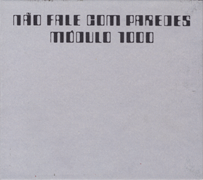 Modulo 1000 "Nao Fale Com Paredes" (Top Tape, 1970) (LP)
Modulo 1000 "Nao Fale Com Paredes" (Top Tape, 1970) (LP)
I have a somewhat suspicious mind, so when I finally got around to checking out this "legendary lost album" from the early 1970s, I immediately wondered if it was a hoax... I mean, here was a wild-sounding psych-prog/heavy rock group from the tropicalia era that, for all its clumsiness, kind of blows the big name artists such as Os Mutantes and Caetano Veloso out of the water, at least in terms of being a real, live cutting-edge, contemporary hard rock band. The crude, cutting, wailing, electric lead guitar, the sludgy, Sabbath-esque proto-metal riffs, the guttural, faux-liturgical vocals and the deep plunges into tranq-rock territory are so blazingly authentic and so completely divorced from what 99% of the rest of Brazil was into, it's really quite remarkable. This Rio-based band was in touch with elements of the American-British hard rock scene that loftier artistes such as Veloso and Gilberto Gil had little interest in. Crunchy, grungy, sloppy bands such as Steppenwolf and Iron Butterfly seem as much a part of their palate as do Hendrix and krautrockers like Can -- I'm not saying this is great music, or that I'd really want to listen to it on a rainy day at home, but it's got a lot of historical heft, in terms of it's hipness, relative to what was happening elsewhere in the world. If you're into freaky acid rock from the 'Sixties and 'Seventies, you'll want to check this one out. (PS - oh yeah, by the way, it's not a hoax. For more info, contact the reissue label, World In Sound.)
 Modulo Quatro "Bossa Carrossel Brasileiro" (Chantecler, 1970) (LP)
Modulo Quatro "Bossa Carrossel Brasileiro" (Chantecler, 1970) (LP)
Perky easy listening instrumentals, with jaunty organ playing that might appeal to fans of Walter Wanderley. It's not really my cup of tea, although there are some pleasant grooves. The cuica-like playing (are those vocals?) on "Voce Voltou" is a hoot! The group included Mário Augusto on bass, Toni Marcilio (drums), Carlos Nóbrega (piano) and Joni Soto (guitar) on what appears to have been the band's only album.
 Tony Mola "Bragada" (Blue Jackel Records, 1996)
Tony Mola "Bragada" (Blue Jackel Records, 1996)
In the 1990s, Bahia-born drummer Tony Mola was a pioneer of the Brazilian pop-samba-Caribbean fusion known as axe music. This album is a strong, poppy blend of forro and axe pop, smoothly incorporating galloping, clattering Afro-Brasilian percussion as well as Caribbean-flavored soca arrangements. The drumming may be a little too muted in the mix, but still this is a pleasant, listenable album, with warm lead and bright chorus vocals.
 Tony Mola & Bragada "Quebra Mola" (Blue Jackel Records, 1998)
Tony Mola & Bragada "Quebra Mola" (Blue Jackel Records, 1998)
(Produced by Tuta Aquino)
A sharp, punchy mix of forro, soca-tinged pop, and rapid-fire bloco afro style percussion. The album starts on a sour note (bad rock guitars), and about half the tracks on here don't do much for me. The other half are irresistible, though, with infectious melodies and seductive rhythm. Recommended.
 Tony Mola "Samba + Samba" (Blue Jackel Records, 2006)
Tony Mola "Samba + Samba" (Blue Jackel Records, 2006)
(Produced by Tony Mola)
Sweet, understated samba with soft, compelling, bossa-influenced vocals, a gentle croon set to willowy mandolins and insistent, yet muted, Afro-Brazilian drumming. This time around Mola has altogether dropped the pop/axe elements of his earlier albums, presenting an elegant, mature work that harkens back to the 1970s-era pagode style... Very pretty and very listenable. Recommended!
(Grupo) Molejo - see artist discography
 Moleque De Rua "Moleque De Rua/Street Kids Of Brazil" (Sony Brasil, 1992)
Moleque De Rua "Moleque De Rua/Street Kids Of Brazil" (Sony Brasil, 1992)
There are a couple of good tunes on this intriguing but awkward mix of samba and slick rock-pop. The gimmick is that this band features several poor street kids, straight from the Sao Paulo favelas, banging away on percussive instruments made from tin cans, trash can lids and other scrap metal. THAT sounds interesting, but the pop music draped around it is too pervasive, and you never get to hear the kids get sloppy, mean and gritty. Worth checking out, though.
Moleque De Rua "Pimenta Malagueta" (2002)
 Moleque De Rua "Final Feliz" (Naive Records, 2007)
Moleque De Rua "Final Feliz" (Naive Records, 2007)
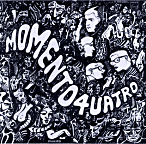 Momento Quatro "Momento Quatro" (Philips, 1968)
Momento Quatro "Momento Quatro" (Philips, 1968)
(Arrangements by Rogerio Duprat)
Wow. Really. This is a cool sunshine-pop album with group vocals by a quartet featuring Ze Rodrix and Ricardo Sa (aka Ricardo Villa) along with Mauricio Mendonca and David Tygel (who later co-founded the pop band Boca Livre...) It's a lively set with perky, pleasantly orchestrated arrangements courtesy of tropicalia maestro, Rogerio Duprat. Duprat doesn't spend a lot of time trying to be clever or get us all tripped out; he just provides some groovy orchestrations that give a fun, sympathetic backing to the group's lovely songs. It's kind of like The Association meets Tom Jobim... Recommended!
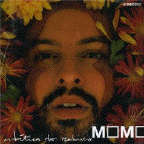 Momo "A Estetica Do Rebisco" (Dubas, 2007)
Momo "A Estetica Do Rebisco" (Dubas, 2007)
(Produced by Marcelo Frota)
An unusual and totally atypical Brazilian rock album, drawing heavily on the space-rock and soft-prog sounds of the early 1970s. Bowie, Syd Barrett, the gentler side of Pink Floyd and a gazillion less well-remembered psychedelic strummers of that era are evoked in this gentle, diffuse album, a collection of spaced-out songs that is unlike any other Brazilian record I've ever heard. (Perhaps Otto's trip-hoppy electronica comes closest...) Singer/keyboardist Marcelo Frota is the main creative force, although several of the songs are co-written with others (anyone know if co-composer Alvinho Lancellotti is related to Domenico Lancellotti, of the Moreno Veloso/+2 crew? Just wondering.) It's nice stuff: folks who dig Davendra Banhart and his brand of freak-folk might also get a kick out of this odd, dreamy disc. Worth checking out!
Monarco - see artist discography
 Monobloco "Monobloco 2002" (Universal, 2002)
Monobloco "Monobloco 2002" (Universal, 2002)
A lively batucada percussion-oriented offshoot of Pedro Luis E A Parede... This popular Rio band mixes soul-samba, rap and rock influences, all woven into a drum-heavy mix. Where Olodum's pop crossovers seem anchored in the 1980s, Monobloco are way more modern. Definitely worth checking out.
 Monobloco "Ao Vivo" (Som Livre, 2006)
Monobloco "Ao Vivo" (Som Livre, 2006)
Monobloco "Ao Vivo" (DVD) (Som Livre, 2006)
A video version of the live album from 2006... Includes opening and closing numbers that are not on the CD.
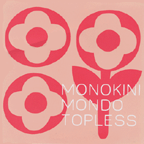 Monokini "Mondo Topless" (Bizarre Records, 1998)
Monokini "Mondo Topless" (Bizarre Records, 1998)
(Produced by Paulo Beto Na Lobo)
Yay...! A Sao Paulo rock band with some nice, uncomplicated hipsterrific indie-pop, which ranges from bouncy, brainless power-pop to Bacharach-tinged Stereolabbiness... Very much in keeping with all the twee stuff that was going on in the UK and US around the same time. If you like artists such as Stereo Total, April March or Die Moulinettes, then this disc is for you. Extra points for keeping the lyrics (when there are lyrics) in Portuguese... Much appreciated!
 Monsueto/Various Artists "Musica Popular Brasileira -- Grandes Autores" (RCA-Camden, 1973) (LP)
Monsueto/Various Artists "Musica Popular Brasileira -- Grandes Autores" (RCA-Camden, 1973) (LP)
A tribute to samba/pop songwriter Monsueto Menezes, released just after his death in 1973, with classic 1950s "radio singers" recordings from some of the older, original interpreters of his music, such as Linda Batista, Angela Maria and Marlene, as well as one track featuring Monsueto himself, and an opening track from Maria Bethania, who at the time was perhaps the biggest star in Brazil. This collection probably felt pretty antiquated and anachronistic even when it came out, but it stands up to the test of time, and is a fitting tribute to this prolific composer.
Monsueto/Various Artists "Serie Raizes Do Samba" (EMI, 2000)
Marisa Monte - see artist discography
Cyro Monteiro - see artist discography
Doris Monteiro - see artist discography
Oswaldo Montenegro - see artist discography
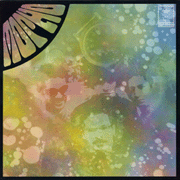 Mopho "Mopho" (Baratos Afins, 2000)
Mopho "Mopho" (Baratos Afins, 2000)
Cool stuff! Definitely off the beaten track as far as Brazilian pop goes... indiepop isn't really big in Brazil, and the hometown bands are incredibly hard to track down, even down there. This is fairly trippy, psychedelia-tinged power-pop that seems to take its cues from old George Harrison and Badfinger albums, with a touch of "heavier" rock ala Rod Argent and the like. Although this Sao Paulo band has its limitations, it's still fun to hear these old '70s boogie rock and lush, Beatles-y pop riffs fronted by Portuguese vocals. Several songs are catchy and stand up on their merit -- lighthearted, dreamy, and definitely worth checking out either as an indie fan or as a Brazilian rock buff. [NOTE: the Baratos Afins record store, which put this album out, is probably the only place you're likely to find this album. Check out their website for mailorder info, as well as info on other Brazilian indie bands.]
Mopho "Sine Diabolo Nullus Deus" (Baratos Afins, 20--?)
Katia Moraes "Ten Feet And The Sun" (1997)
 Katia Moraes & Sambaguru "Ginga" (Sugarcane Records, 1999)
Katia Moraes & Sambaguru "Ginga" (Sugarcane Records, 1999)
First-rate jazz-MPB vocals in the style of Elis Regina and Gal Costa. Moraes has a sweet, clear voice and sharp phrasing, and is obviously well-versed in Brazilian musical history (the album opens with an homage to various musicians). Likewise, her band, Sambaguru, play tightly and with feeling, covering a wide variety of styles including jazz, samba, axe, and even a bit of Indian classical. It has a few predictable pop foibles, but compared to much of the '70s MPB this is modeled on, this album is a paragon of restraint. Hopefully being based in LA, rather than Rio, won't count against these folks -- they sound great, and deserve a wide
audience. For more info, visit their website at: http://www.katiamoraes.com.
 Katia Moraes & Sambaguru "Live: April 11-12th, 2003" (Kufala, 2003)
Katia Moraes & Sambaguru "Live: April 11-12th, 2003" (Kufala, 2003)
A fine live set, recorded in a Studio City, CA nightclub, under what must have been ideal conditions. The sound quality of these recordings is remarkably good, and is matched by the enthusiasm of Moraes and her band. Her similarity to Clara Nunes becomes even more apparent, although there's also a strong jazz element at play here. Most of the songs here are originals, co-written with pianist Bill Brendle, and are of a par with the cover tunes they choose, material by the likes of Joao Bosco, Djavan, Sivuca and Hermeto Pascoal... there's even a tune here by modern rocker Lenine! Two CDs worth of fine material, released on CDR, but still well worth checking out.
Katia Moraes & Sambaguru "Navegar Ao Sol" (Moondo, 2005)
 Pedro Moraes "Samba Do Bau -- E Com Esse Que Eu Vou" (Brazilmusica, 2008)
Pedro Moraes "Samba Do Bau -- E Com Esse Que Eu Vou" (Brazilmusica, 2008)
Sleek, mellow sambas with a slick, modern production style, in the tradition of artists such as Martinho Da Vila and Paulinho Da Viola. Apparently this album features a number of songs composed by several samba masters -- Cartola, Da Viola, Nelson Sargento, and others -- that had been previously unrecorded by any other artist. It's rootsy and sweet, but also with enough of a pop gloss that it may feel too controlled at times, although it's definitely on the less-popped out side of the spectrum. Depends on your mood, I suppose, but it's definitely worth checking out.
 Pedro Moraes "Claroescuro" (Independent, 2010)
Pedro Moraes "Claroescuro" (Independent, 2010)
On his second album, Moraes dives deeper into the world of ornate pop crossovers familiar to fans of the MPB of the 1970s and '80s; although there's still a samba vibe underlying the album, a glossier, more boldly fusion-oriented sound pervades, with a strong debt to jazz-oriented MPB-ers such as Milton Nascimento. Pat Metheny-ish guitars and air electric bass mixes with heavy, electronica-tinged backbeats -- I recoiled at the first few notes, but then found myself drawn in. If you enjoy funky pop-samba crossover stars like Carlinhos Brown or Seu Jorge, you might really dig this as well.
Marcos Moran "Do Jeito Que A Gente Quer" (Caravelle, 1972) (LP)
 Marcos Moran & Samba Som 7 "Transamba" (Caravelle, 1973)
Marcos Moran & Samba Som 7 "Transamba" (Caravelle, 1973)
A nice set of poppy '70s samba, featuring male vocals by Moran and female vocals -- both in a bright, chirpy chorus and Rita Lee-esque solo vox -- from a duet called Silvia & Sandra. The repertoire is heavy on songs by Antonio Carlos & Jocafi, with additional samba songs by Chico Buarque, Paulinho da Viola and the guys from Novos Baianos, as well as several tracks by more obscure roots-samba composers. The record starts off sounding like more of a pop record than it turns out to be: most of the album has a stripped-down acoustic pagode sound, and sounds quite nice. Maybe it's not as earthy or thunderous as some of the heavy-hitters on the pagode scene (Clara Nunes, et. al.) but it's still quite groovy. Worth tracking down... (even if the Little Black Sambo cover art is a little scary...)
Marcos Moran "Brasileirissimas" (Polydor)
Marcos Moran "Brasileirissimas, v.2" (Polydor, 1978) (LP)
Juarez Moreira "Nuvens Dourados"
A tribute to Tom Jobim...
Juarez Moreira "Aquarelas"
A tribute to composer Ary Barroso, with saxophonist Nivaldo Ornelas and the Chamber Orchestra Sesiminas.
Juarez Moreira "Bom Dia" (Malandro, 1998)
Juarez Moreira & Badi Assad "Instrumental No CCBB" (Azul, 2002)
A live performance at the Centro Cultural Banco do Brasil...
Moraes Moreira - see artist discography
Wilson Moreira & Nei Lopes "A Arte Negra De..." (EMI, 1997)
Wilson Moreira "Okolofe" (Rob Digital, 2000)
Wilson Moreira "Entidades, v.1" (Radio MEC, 2002)
Wilson Moreira "Peso Na Balanca" (Atracao, 2007)
Jacques Morelenbaum - see artist discography
 Paula Morelenbaum "Berimbaum" (Universal/Mirante, 2004)
Paula Morelenbaum "Berimbaum" (Universal/Mirante, 2004)
(Produced by Paula Morelenbaum, Antonio Pinto, Leo Gandelman & Outros)
Paula Morelenbaum "Telecoteco" (Universal, 2008)
Paula Morelenbaum & Ralf Schmid SWR Big Band "Bossarenova" (Obliqsound/Skip Records, 2009)
Paula Morelenbaum & Joao Donato "Agua" (Biscoito Fino, 2011)
Clara Moreno "Clara Moreno" (1996)
Clara Moreno "Mutante" (Timewarp, 1999)
Clara Moreno "Morena Bossa Nova" (Ybrasil?, 2002)
 Clara Moreno "Meu Samba Torto" (Atracao/Compass, 2007)
Clara Moreno "Meu Samba Torto" (Atracao/Compass, 2007)
A sweet set of classic-sounding, acoustic-based Brazilian bossa nova, with delicate but confident vocals by Clara Moreno and gorgeous accompaniment by singer-guitarist Celso Fonseca. It's a somewhat staid set -- Moreno follows a conservative, classicist's path, dipping back into the treasure trove of 1930s samba-cancao for gems by Ary Barroso, Joao de Barro, Lupicino Rodrigues, bossa-era ballads and sambas by Elton Medeiros, Durival Ferreira and Jorge Ben, along with three modern compositions from Fonseca and one tune from her mother, MPB-jazz legend, Joyce. Joyce plays guitar on two tracks (including one new song she wrote especially for this record) while and her partner, Tutty Moreno (Clara's step-father), plays drums and percussion on about half the album. Add bassist/producer Rodolfo Stroeter, into the mix, and you've got a fine album crafted by some of Brazil's best players. The album is very sweet, and while Moreno doesn't take many risks, she does make beautiful music, particularly when harmonizing with Fonseca (who is still a dead ringer for the legendary Caetano Veloso...) Definitely worth checking out.
Clara Moreno "Miss Balanco" (Far Out Records, 2009)
 Ted Moreno "Sambas Que A Vida Escreveu" (Continental, 1960) (LP)
Ted Moreno "Sambas Que A Vida Escreveu" (Continental, 1960) (LP)
Suave, bossa-ish vocals in a lush, orchestral samba-pop setting with undertones of big bandish gafieira jazz... Both hip and corny, this has a pleasant feel, not quite dipping into the old-fashioned romantic bathos of boleros while also not fully part of the modernistic bossa sound. A nice middle ground. No info on the backing musicians, though I imagine the horn players and accordionist were all top talent.
Morgana "Morgana" (Copacabana, 1960) (LP)
Morgana "A Fada Loura" (Copacabana, 1962) (LP)
Morgana "Fuga Com Morgana" (Copacabana, 1962) (LP)
Morgana "A Romantica" (Copacabana, 1963) (LP)
Paulinho Moska - see artist discography
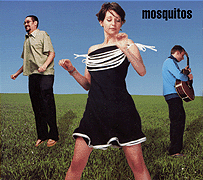 The Mosquitos "Mosquitos" (Bar None, 2003)
The Mosquitos "Mosquitos" (Bar None, 2003)
An absolute delight. Finding the perfect midway point between Brazilian cool and sugary indiepop twee, New York's Mosquitos feature vocals by Juju Stulbach, a Rio-born expatriate who combines the airy, insouciance of Astrud Gilberto with the flip, casual, DIY mellowness of the North American cutesy-pop crowd. There's a relaxed love of melody that suggests a debt to Yo La Tengo, as well as a simplicity and cleanness of line that brings The Bats to mind... Stulbach's Portuguese-language vocals are a highlight, with a fluidity and good-natured tone that should draw in any devotee of classic, roller-rinky Brazilian pop, as well as fans of BMX Bandits, Beat Happening and the whole Pacific Northwest lo-fi scene. Admittedly, the cutesy, naifish English-language lyrics of singer-guitarist Chris Root don't hold up as well to repeated listenings, but they put the record into the right context... In short, this is the perfect twee-pop album that native Brazilian indie bands have yet to create: it's lovely and dreamy, full of pretty sounds and foreign words... and I like it a lot!
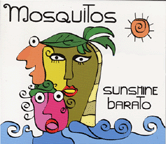 The Mosquitos "Sunshine Barato" (Bar None Records, 2004)
The Mosquitos "Sunshine Barato" (Bar None Records, 2004)
This disc continues on the much same path as the first Mosquitos set, though perhaps with more of an indiepop inclination, but the Brazilianness is still there, too. Perhaps because they are now a known quantity, this disc is a little less striking than its predecessor, but it's still pretty cute and pretty cool. A fun splash in the sun, with lots of perky melodies and catchy, playful hooks.
 The Mosquitos "III" (Bar None Records, 2006)
The Mosquitos "III" (Bar None Records, 2006)
Alas, this one fell a little flat for me... Mostly just a generic indie-rock album, with little "Brazilianness" to it, including a big tilt towards English-language lyrics. It's okay, but not as creative or as fun as their first album. Alas. Maybe another record will come out someday?
Alberto Mota "Voa Meu Samba" (Polydor, 19--?) (LP)
With vocals by Arnaldo Henriques ("crooner") and Maria Nazare ("lady crooner")... Not sure when this came out, but I'm guessing late '50s/early '60s... Anyone know more about these folks?
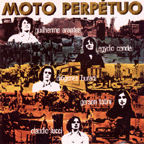 Moto Perpetuo "Moto Perpetuo" (Warner, 1974) (LP)
Moto Perpetuo "Moto Perpetuo" (Warner, 1974) (LP)
(Produced by Peninha Schmidt)
A noteworthy pop-rock album, featuring contributions from songwriter (and future solo artists) Guilherme Arantes and guitarist Egidio Conde (who later joined the experimental band, Som Nosso De Cada Dia).
Tiao Motorista "Samba E Talento" (Copacabana, 1970)
Tiao Motorista "Meu Interior" (CBS) (LP)
Ed Motta - see artist discography
Zeze Motta - see artist discography
Mauricy Moura "Coquetel Da Vida" (Chantecler, 1963) (LP)
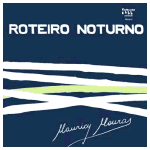 Mauricy Moura "Roteiro Noturno" (Continental, 1964) (LP)
Mauricy Moura "Roteiro Noturno" (Continental, 1964) (LP)
A tremendously corny, emotive singer, with deep, throaty tones, Mauricy Moura (1926-1977) harkened back to the bolero-tinged romanticism of the radio singers era, although the band backing him hints at the crisp vitality of the early '60s bossa-nova scene. Perhaps this isn't so surprising, since it's Hermeto Pascoal and his band, with Pascoal providing all the arrangements and playing flute (and piano, on some tracks) along with an otherwise-anonymous "Conjunto Hermeto." In some regards, the accompaniment is sympathetic and effective, although you can sense them champing at the bit, eager to stretch out musically beyond Moura's hopelessly outdated, schmaltzy performances. Still, it was a paying gig. I don't have much info about Moura; apparently he was a regular performer on the Radio Atlantica broadcast, and died in the 1970s when he was only about fifty years old. This was his only full album, although he also released about a dozen singles over the course of his career, dating back to the early 'Fifties. Fans of romantic balladeers such as Altemar Dutra or Ivon Curi would probably appreciate this too. Also nice to hear what Hermeto was up to at the time.
Paulo Moura - see artist discography
MPB-4 - see artist discography
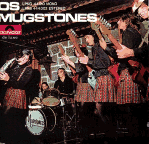 Os Mugstones "Os Mugstones" (1967)
Os Mugstones "Os Mugstones" (1967)
This kilt-clad combo crafted a kooky mix of frat rock, Viscounts-ish instrumental pop, and some genuine Brazilian freakbeat gems. The lackluster instrumentals outnumber the rock tunes, but they don't outweigh them: the handful of groovy rock songs definitely make this disc worth checking out.
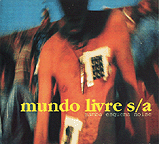 Mundo Livre s/a "Samba Esquema Noise" (Banguele, 1994)
Mundo Livre s/a "Samba Esquema Noise" (Banguele, 1994)
The debut album by one of the key bands in Pernambuco's explosive 1990s manguebeat scene... This is an exuberant, uninhibited mix of styles -- funky, guitar-based indie/alt rock, electronic noise and regional Brazilian styles... The tilt towards aggressive, electric rock makes this a little on the loud side for an old geezer like me -- or at least it's not the kind of loud, aggressive rock music that I'm normally into -- but there's still an wild, vibrant creativity at work here that'll make you sit up and pay attention, as well as some quieter moments that are a nice change of page. Percussionist (and future solo performer) Otto was part of the crew in this early edition of the band. Worth checking out!
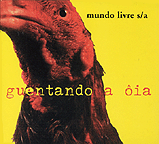 Mundo Livre s/a "Guentando A Oia" (Excelente, 1996)
Mundo Livre s/a "Guentando A Oia" (Excelente, 1996)
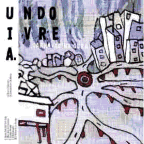 Mundo Livre s/a "Carnaval Na Obra" (Abril/Excelente, 1998)
Mundo Livre s/a "Carnaval Na Obra" (Abril/Excelente, 1998)
Soulful, accomplished '90s alt-rock, with a heavy, funk-drenched approach and an interesting blend of traditional influences. Airy-voiced lead singer "Zero Quatro" bears a more than passing similarity to the great Caetano Veloso, not just in his nasal-yet-suave drawl, but also in his eclectic musical approach. Sometimes the band sits on a groove a little too long, letting things grow static, but overall this is a pretty impressive effort. The use of the cavaquinho next to a heavy soul snare drum is especially nice. Definitely worth checking out, if you're curious about the more modern-sounding Brazilian bands.
Mundo Livre s/a "Por Pouco" (Abril, 2000)
Mundo Livre s/a "Bebadogroove, v.1" (Tratore, 2006)
Mundo Livre s/a "Mundo Cao" (Som Livre, 2007)
Mundo Livre s/a "Combat Samba" (DeckDisc, 2008)
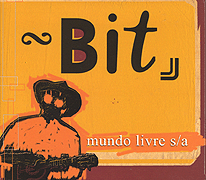 Mundo Livre s/a "Bit (Box Set)" (Deck Disc, 2004)
Mundo Livre s/a "Bit (Box Set)" (Deck Disc, 2004)
A 4-CD box set which includes reissues of their first four albums -- Samba Esquema Noise, Guentando A Oia, Carnaval Na Obra, and Por Pouco -- along with an added disc of video material. Unlike many Brazilian rock boxes, this isn't just a repackaging of regular jewel-box CDs, but rather a floppy fold-out cardboard thingie, with an additional booklet of liner notes and written material. Good introduction to the band!
 Celso Murilo "Mr. Ritmo" (Pawal, 1961) (LP)
Celso Murilo "Mr. Ritmo" (Pawal, 1961) (LP)
 Celso Murilo "Isto E O Drink" (Remon, 1962) (LP)
Celso Murilo "Isto E O Drink" (Remon, 1962) (LP)
Soul-samba pioneer Wilson Simonal sings on two tunes, making his debut alongside jazz organist Celso Murilo and his group, the rather zippy, upbeat house band from an old Rio nightclub known as Drink... He's one of several singers with the band, and he's definitely the best. Singing and swinging, Simonal is on top of the beat in a way that the others are not -- he's hep and full of charisma. The other singers have their charms as well, though: there are Luiz Bandeira and samba-cancao songbirds Lila and the ill-fated Sandra, who died in a car crash about the time this disc came out. Overall, it's quite a lively, enjoyable album, mixing a hefty dose of authentic samba with cheerful nightclub swing. Simonal, already under contract to Odeon, was clearly the star attraction, and devoted fans will definitely want to track this one down.
 Celso Murilo "Tremendo Balanco" (EMI-Odeon, 1964) (LP)
Celso Murilo "Tremendo Balanco" (EMI-Odeon, 1964) (LP)
An old-school bossa-jazz set, with backing from Edison Machado on drums, and Astor Silva playing trombone. Maestro Lyrio Panicalli is credited as the album's arranger as well...
Ramiro Musotto "Nostalgias" (Revivendo, 2003)
 Ramiro Musotto "Sudaka" (Fast Horse, 2003)
Ramiro Musotto "Sudaka" (Fast Horse, 2003)
Modern electronic remix tracks, with samples drawn from ethnomusical percussion albums, candomble rituals, the afro-samba band Ile Aiye, old cinema novo films, and from field recordings made in towns inside Brazil's Mato Grosso and in rural Argentina. The mixing and production concepts seem somewhat unidimensional, but it's still very nice, and the choices of source material are pretty creative... Although he was born in Argentina, percussionist Musotto is very much in the thick of the modern Brazilian pop scene, working with heavy-hitters such as Caetano Veloso, Marisa Monte and Daniella Mercury, to name a few. There's a Sergio Ricardo credited on one track here, presumably it's the old 1960s bossa nova pioneer; yet another reason to check this disc out.
Ramiro Musotto "Civilizacao & Barbarye" (Circular Moves, 2006)
 Mussum "Agua Benta" (RCA, 1978) (LP)
Mussum "Agua Benta" (RCA, 1978) (LP)
A serious roots-samba musician who was part of the early lineup of Os Originais Do Samba, Antonio Carlos Bernardes Gomes (aka Mussum, 1941-1994) is now best remembered as a comedic performer and television personality, and as a member of the music/comedy group Os Trapalhoes. Unfortunately, his acting career has greatly overshadowed his musical work, and more complete discographical information is a little hard to come by... (Anyone know a good source of information? I'd also be interested in a Brazilian perspective on Mussum's acting career -- he seems to have quite cult following...) Anyway, a tune or two has made it onto various samba and samba-rock compilations, but for the most part Mussum's musical releases remain pretty elusive. Hopefully I can track a few albums down and let you know how they sound...
Mussum "Mussum" (Sony, 1980) (LP)
Mussum "Filosofia De Quintal" (RCA, 1987)
Os Mutantes - see artist discography
Os Mutreteiros Grilados "Coisas Nossas" (Girasom)
 Afonso Machado "Bandolim Do Brasil" (Rob Digital, 2004)
Afonso Machado "Bandolim Do Brasil" (Rob Digital, 2004)
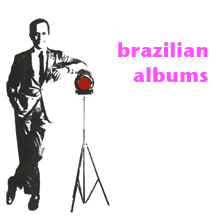
 Edison Machado "...E Samba Novo" (CBS, 1963) (LP)
Edison Machado "...E Samba Novo" (CBS, 1963) (LP)
 Edison Machado "Obras 2: O Pulo Do Gato" (Vivis Sound, 2004)
Edison Machado "Obras 2: O Pulo Do Gato" (Vivis Sound, 2004)
 Regina Machado "Sobre A Paixao" (Dabliu, 2000)
Regina Machado "Sobre A Paixao" (Dabliu, 2000)
 Ed Maciel "Essa E A Jogada" (Copacabana, 1973) (LP)
Ed Maciel "Essa E A Jogada" (Copacabana, 1973) (LP)
 Madrigal Renascentista "Antologia Da Modinha Brasileira" (Philips, 1976) (LP)
Madrigal Renascentista "Antologia Da Modinha Brasileira" (Philips, 1976) (LP)
 Mauricio Maestro/Nana Vasconcelos "Upside Down" (Far Out, 2011)
Mauricio Maestro/Nana Vasconcelos "Upside Down" (Far Out, 2011)
 Os Magnatas Do Samba "Ninguem Ensaiou" (CBS, 1971) (LP)
Os Magnatas Do Samba "Ninguem Ensaiou" (CBS, 1971) (LP)
 Amado Maita "Amado Maita" (Copacabana, 1972) (LP)
Amado Maita "Amado Maita" (Copacabana, 1972) (LP)
 Luisa Maita "Lero Lero" (Cumbancha, 2010)
Luisa Maita "Lero Lero" (Cumbancha, 2010)
 Celia Malheiros "Sempre Crescendo" (Sempre Crescendo, 2001)
Celia Malheiros "Sempre Crescendo" (Sempre Crescendo, 2001)
 Celia Malheiros/Carlos Malta/Thomas Clausen "After The Carnaval" (Stunt Records, 2009)
Celia Malheiros/Carlos Malta/Thomas Clausen "After The Carnaval" (Stunt Records, 2009)
 Gui Mallon "Live At Montreux" (Adventure Music, 2004)
Gui Mallon "Live At Montreux" (Adventure Music, 2004)
 Mamelo Sound System "Urbalia" (Ybrazil Records, 2003)
Mamelo Sound System "Urbalia" (Ybrazil Records, 2003)
 Mandala "Mandala" (Morisom, 1976) (LP)
Mandala "Mandala" (Morisom, 1976) (LP)
 Marcelo "Marcelo" (EMI, 1978) (LP)
Marcelo "Marcelo" (EMI, 1978) (LP)
 Marcia "Eu E A Brisa" (Philips, 1968) (LP)
Marcia "Eu E A Brisa" (Philips, 1968) (LP)
 Luiza Maria "Eu Queria Ser Um Anjo" (Philips, 1975) (LP)
Luiza Maria "Eu Queria Ser Um Anjo" (Philips, 1975) (LP)
 Marcia Maria "Marcia Maria" (Capitol Records, 1978) (LP)
Marcia Maria "Marcia Maria" (Capitol Records, 1978) (LP)
 Marcia Maria "Colo Do Rio" (Caravage/L'Arome, 1985)
Marcia Maria "Colo Do Rio" (Caravage/L'Arome, 1985)
 Neusa Maria "A Melhor Cantora De 1956" (Sinter, 1957) (LP)
Neusa Maria "A Melhor Cantora De 1956" (Sinter, 1957) (LP)
 Evandro Marinho "O Som Do Barzinho, v.10" (Universal/Matrix, 2001)
Evandro Marinho "O Som Do Barzinho, v.10" (Universal/Matrix, 2001)
 Francisco Mario "Retratos" (Fantasy/Caju Records, 1994)
Francisco Mario "Retratos" (Fantasy/Caju Records, 1994)
 Andrea Marquee "Zumbi" (YBrazil/Stern's, 2000)
Andrea Marquee "Zumbi" (YBrazil/Stern's, 2000)
 Jayme Marques "Brasil Pop" (RCA-Spain, 1975) (LP)
Jayme Marques "Brasil Pop" (RCA-Spain, 1975) (LP)
 Jayme Marques "So Much Feeling" (RCA-Spain, 1977) (LP)
Jayme Marques "So Much Feeling" (RCA-Spain, 1977) (LP)
 Moacyr Marques "Jazz & Bossa Nova" (Tiger Records, 1961) (LP)
Moacyr Marques "Jazz & Bossa Nova" (Tiger Records, 1961) (LP)
 Paulo Marquez & Carmen Costa "Musica De Paulo Vanzolini" (Discos Marcus Pereira, 1974)
Paulo Marquez & Carmen Costa "Musica De Paulo Vanzolini" (Discos Marcus Pereira, 1974)
 Mar Revolto "Mar Revolto" (Musiquim, 1979) (LP)
Mar Revolto "Mar Revolto" (Musiquim, 1979) (LP)
 Abilio Martins "Voltei" (Tropicana, 1970) (LP)
Abilio Martins "Voltei" (Tropicana, 1970) (LP)
 Herivelto Martins/Various Artists "Jubileu Herivelto" (RCA Victor, 1957) (LP)
Herivelto Martins/Various Artists "Jubileu Herivelto" (RCA Victor, 1957) (LP)
 Herivelto Martins/Various Artists "SINFONIA DE PARDAIS: UMA HOMAGEM A HERVIELTO MARTINS" (Som Livre, 1999)
Herivelto Martins/Various Artists "SINFONIA DE PARDAIS: UMA HOMAGEM A HERVIELTO MARTINS" (Som Livre, 1999)
 Nelly Martins & Tito Madi "Encontro No Sabado -- Um LP Para Namorados" (Continental, 1959) (LP)
Nelly Martins & Tito Madi "Encontro No Sabado -- Um LP Para Namorados" (Continental, 1959) (LP)
 Ana Martins "Linda" (Rip Curl, 2001)
Ana Martins "Linda" (Rip Curl, 2001)
 Aurea Martins "O Amor Em Paz" (RCA Camden, 1972) (LP)
Aurea Martins "O Amor Em Paz" (RCA Camden, 1972) (LP)
 Edinho Marundele & Onias Comenda "Eu, Bahia" (Philips/Fontana, 1972) (LP)
Edinho Marundele & Onias Comenda "Eu, Bahia" (Philips/Fontana, 1972) (LP)
 Helio Matheus "Helio Matheus" (RCA-Victor, 1975) (LP)
Helio Matheus "Helio Matheus" (RCA-Victor, 1975) (LP)
 Pedrinho Mattar "Um Show De Mattar" (Copacabana, 1971) (LP)
Pedrinho Mattar "Um Show De Mattar" (Copacabana, 1971) (LP)
 Matuskela "Matuskela" (Chantecler, 1973) (LP)
Matuskela "Matuskela" (Chantecler, 1973) (LP)
 Matuto "Matuto" (Self-released, 2011)
Matuto "Matuto" (Self-released, 2011)
 Jose Mauro "Obnoxious" (Quartin, 1970) (LP)
Jose Mauro "Obnoxious" (Quartin, 1970) (LP)
 Yo-Yo Ma "Obrigado Brazil" (Sony Classics, 2003)
Yo-Yo Ma "Obrigado Brazil" (Sony Classics, 2003)
 Rose Max "Atlantico" (Cinq Etoiles, 2003)
Rose Max "Atlantico" (Cinq Etoiles, 2003)
 Ana Mazzotti "Ana Mazzotti" (Top Tape, 1974) (LP)
Ana Mazzotti "Ana Mazzotti" (Top Tape, 1974) (LP)
 Ze Luiz Mazziotti "Cancoes De Chico Buarque" (Dabliu, 2002)
Ze Luiz Mazziotti "Cancoes De Chico Buarque" (Dabliu, 2002)
 MC Buchecha "MC Buchecha" (Universal-Mercury, 2003)
MC Buchecha "MC Buchecha" (Universal-Mercury, 2003)
 Arnoldo Medeiros "O Homen, O Poeta" (RCA, 1975) (LP)
Arnoldo Medeiros "O Homen, O Poeta" (RCA, 1975) (LP)
 Geraldo Medeiros & Orquestra Brasileira De Ritmos "Dancando O Frevo" (Musidisc, 1956) (LP)
Geraldo Medeiros & Orquestra Brasileira De Ritmos "Dancando O Frevo" (Musidisc, 1956) (LP)
 Os Megatons "Os Megatons " (Philips, 1964) (LP)
Os Megatons "Os Megatons " (Philips, 1964) (LP)
 Helena Meirelles "Raiz Pantaneira" (Eldorado, 1998)
Helena Meirelles "Raiz Pantaneira" (Eldorado, 1998)
 Helena Meirelles "Flor Da Guavira" (Eldorado, 1999)
Helena Meirelles "Flor Da Guavira" (Eldorado, 1999)
 Joao Mello "A Bossa Do Balanco" (Philips, 1963) (LP)
Joao Mello "A Bossa Do Balanco" (Philips, 1963) (LP)
 Fernando Mendes "Fernando Mendes" (EMI, 1974) (LP)
Fernando Mendes "Fernando Mendes" (EMI, 1974) (LP)
 Fernando Mendes "Fernando Mendes" (EMI, 1975) (LP)
Fernando Mendes "Fernando Mendes" (EMI, 1975) (LP)
 Helio Mendes "Weekend No Rio" (Musiplay, 1963) (LP)
Helio Mendes "Weekend No Rio" (Musiplay, 1963) (LP)
 Roberto Mendes "Traducao" (Atracao, 2002)
Roberto Mendes "Traducao" (Atracao, 2002)
 Os Meninos Do Deus "Aperte...Nao Sacuda!" (1974) (LP)
Os Meninos Do Deus "Aperte...Nao Sacuda!" (1974) (LP)
 Os Meninos Do Rio "Os Meninos Do Rio" (Sony/Carioca Discos, 2000)
Os Meninos Do Rio "Os Meninos Do Rio" (Sony/Carioca Discos, 2000)
 Mestre Ambrosio "Mestre Ambrosio" (Tratore, 1997)
Mestre Ambrosio "Mestre Ambrosio" (Tratore, 1997)
 Mestre Ambrosio "Fua Na Casa De Cabral" (Sony/Chaos, 1999)
Mestre Ambrosio "Fua Na Casa De Cabral" (Sony/Chaos, 1999)
 Mestre Ambrosio "O Terceiro Samba" (Sony, 2001)
Mestre Ambrosio "O Terceiro Samba" (Sony, 2001)
 Mestre Caicara "Academia De Capoeira De Angola Sao Jorge Dos Irmaos Unidos Do Mestre Caicara" (EMI-Copacabana, 1973) (LP)
Mestre Caicara "Academia De Capoeira De Angola Sao Jorge Dos Irmaos Unidos Do Mestre Caicara" (EMI-Copacabana, 1973) (LP)
 Mestre Marcal "A Incrivel Bateria Do Mestre Marcal" (Polydor, 1987) (LP)
Mestre Marcal "A Incrivel Bateria Do Mestre Marcal" (Polydor, 1987) (LP)
 Mestre Marcal "Samba Enredo De Todos Os Tempos" (Velas, 1993)
Mestre Marcal "Samba Enredo De Todos Os Tempos" (Velas, 1993)
 Metro "A Gota Suspensa" (Underground, 1983) (LP)
Metro "A Gota Suspensa" (Underground, 1983) (LP)
 Metro "Olhar" (CBS, 1985)
Metro "Olhar" (CBS, 1985)
 Hendrik Meurkens "Amazon River" (Blue Toucan, 2005)
Hendrik Meurkens "Amazon River" (Blue Toucan, 2005)
 Luperce Miranda "Luperce Miranda Interpreta Luperce Miranda" (MIS, 1978) (LP)
Luperce Miranda "Luperce Miranda Interpreta Luperce Miranda" (MIS, 1978) (LP)
 Pedro Miranda "Coisa Com Coisa" (Deckdisc, 2006)
Pedro Miranda "Coisa Com Coisa" (Deckdisc, 2006)
 Pedro Miranda "Pimenteira" (Tratore, 2009)
Pedro Miranda "Pimenteira" (Tratore, 2009)
 Mr. Hermano "O Globo" (Disorient/Mr Bongo, 1999)
Mr. Hermano "O Globo" (Disorient/Mr Bongo, 1999)
 Mr. Samba "Mr. Samba E Seus Skindos Ritmicos" (RGE, 1962) (LP)
Mr. Samba "Mr. Samba E Seus Skindos Ritmicos" (RGE, 1962) (LP)
 Dom Mita "O Som Do Black Rio" (Transmita/Whatmusic, 2001)
Dom Mita "O Som Do Black Rio" (Transmita/Whatmusic, 2001)
 Jun Miyake "Innocent Bossa In The Mirror" (Tropical Music, 2002)
Jun Miyake "Innocent Bossa In The Mirror" (Tropical Music, 2002)
 Mocidade Independente De Padre Miguel "Bateria Nota 10" (Top Tape, 1975) (LP)
Mocidade Independente De Padre Miguel "Bateria Nota 10" (Top Tape, 1975) (LP)
 Mocidade Independente De Padre Miguel "Batucada - Percussions Du Bresil" (Iris Musique, 1990)
Mocidade Independente De Padre Miguel "Batucada - Percussions Du Bresil" (Iris Musique, 1990)
 Os Mocorongos "Baile De Estudiantes" (Mocambo, 1961-?) (LP)
Os Mocorongos "Baile De Estudiantes" (Mocambo, 1961-?) (LP)
 Modulo 1000 "Nao Fale Com Paredes" (Top Tape, 1970) (LP)
Modulo 1000 "Nao Fale Com Paredes" (Top Tape, 1970) (LP)
 Modulo Quatro "Bossa Carrossel Brasileiro" (Chantecler, 1970) (LP)
Modulo Quatro "Bossa Carrossel Brasileiro" (Chantecler, 1970) (LP)
 Tony Mola "Bragada" (Blue Jackel Records, 1996)
Tony Mola "Bragada" (Blue Jackel Records, 1996)
 Tony Mola & Bragada "Quebra Mola" (Blue Jackel Records, 1998)
Tony Mola & Bragada "Quebra Mola" (Blue Jackel Records, 1998)
 Tony Mola "Samba + Samba" (Blue Jackel Records, 2006)
Tony Mola "Samba + Samba" (Blue Jackel Records, 2006)
 Moleque De Rua "Moleque De Rua/Street Kids Of Brazil" (Sony Brasil, 1992)
Moleque De Rua "Moleque De Rua/Street Kids Of Brazil" (Sony Brasil, 1992)
 Moleque De Rua "Final Feliz" (Naive Records, 2007)
Moleque De Rua "Final Feliz" (Naive Records, 2007)
 Momento Quatro "Momento Quatro" (Philips, 1968)
Momento Quatro "Momento Quatro" (Philips, 1968)
 Momo "A Estetica Do Rebisco" (Dubas, 2007)
Momo "A Estetica Do Rebisco" (Dubas, 2007)
 Monobloco "Monobloco 2002" (Universal, 2002)
Monobloco "Monobloco 2002" (Universal, 2002)
 Monokini "Mondo Topless" (Bizarre Records, 1998)
Monokini "Mondo Topless" (Bizarre Records, 1998)
 Monsueto/Various Artists "Musica Popular Brasileira -- Grandes Autores" (RCA-Camden, 1973) (LP)
Monsueto/Various Artists "Musica Popular Brasileira -- Grandes Autores" (RCA-Camden, 1973) (LP)
 Mopho "Mopho" (
Mopho "Mopho" ( Katia Moraes & Sambaguru "Ginga" (Sugarcane Records, 1999)
Katia Moraes & Sambaguru "Ginga" (Sugarcane Records, 1999)
 Katia Moraes & Sambaguru "Live: April 11-12th, 2003" (Kufala, 2003)
Katia Moraes & Sambaguru "Live: April 11-12th, 2003" (Kufala, 2003)
 Pedro Moraes "Samba Do Bau -- E Com Esse Que Eu Vou" (Brazilmusica, 2008)
Pedro Moraes "Samba Do Bau -- E Com Esse Que Eu Vou" (Brazilmusica, 2008)
 Pedro Moraes "Claroescuro" (Independent, 2010)
Pedro Moraes "Claroescuro" (Independent, 2010)
 Marcos Moran & Samba Som 7 "Transamba" (Caravelle, 1973)
Marcos Moran & Samba Som 7 "Transamba" (Caravelle, 1973)
 Paula Morelenbaum "Berimbaum" (Universal/Mirante, 2004)
Paula Morelenbaum "Berimbaum" (Universal/Mirante, 2004)
 Clara Moreno "Meu Samba Torto" (Atracao/Compass, 2007)
Clara Moreno "Meu Samba Torto" (Atracao/Compass, 2007)
 Ted Moreno "Sambas Que A Vida Escreveu" (Continental, 1960) (LP)
Ted Moreno "Sambas Que A Vida Escreveu" (Continental, 1960) (LP)
 The Mosquitos "Mosquitos" (Bar None, 2003)
The Mosquitos "Mosquitos" (Bar None, 2003)
 The Mosquitos "Sunshine Barato" (Bar None Records, 2004)
The Mosquitos "Sunshine Barato" (Bar None Records, 2004)
 Moto Perpetuo "Moto Perpetuo" (Warner, 1974) (LP)
Moto Perpetuo "Moto Perpetuo" (Warner, 1974) (LP)
 Mauricy Moura "Roteiro Noturno" (Continental, 1964) (LP)
Mauricy Moura "Roteiro Noturno" (Continental, 1964) (LP)
 Os Mugstones "Os Mugstones" (1967)
Os Mugstones "Os Mugstones" (1967)
 Mundo Livre s/a "Samba Esquema Noise" (Banguele, 1994)
Mundo Livre s/a "Samba Esquema Noise" (Banguele, 1994)
 Mundo Livre s/a "Guentando A Oia" (Excelente, 1996)
Mundo Livre s/a "Guentando A Oia" (Excelente, 1996)
 Mundo Livre s/a "Carnaval Na Obra" (Abril/Excelente, 1998)
Mundo Livre s/a "Carnaval Na Obra" (Abril/Excelente, 1998)
 Mundo Livre s/a "Bit (Box Set)" (Deck Disc, 2004)
Mundo Livre s/a "Bit (Box Set)" (Deck Disc, 2004)
 Celso Murilo "Isto E O Drink" (Remon, 1962) (LP)
Celso Murilo "Isto E O Drink" (Remon, 1962) (LP)
 Ramiro Musotto "Sudaka" (Fast Horse, 2003)
Ramiro Musotto "Sudaka" (Fast Horse, 2003)
 Mussum "Agua Benta" (RCA, 1978) (LP)
Mussum "Agua Benta" (RCA, 1978) (LP)


